#this one turned out more involved than holmes' version
Explore tagged Tumblr posts
Text
[sherlock holmes]
Home. (watson version)
holmes version

#sherlock holmes#john watson#acd johnlock#johnlock#holmeswatson#this one turned out more involved than holmes' version#but that's okay#everytime i draw watson he looks different lmao#it's fine it's fine#acd sherlock holmes
472 notes
·
View notes
Text
Summer 2023 Anime Overview: Undead Murder Farce and My Happy Marriage

Undead Murder Farce
Premise: Our story takes place in Victorian times/the Meji Era. Tsugaru is a half-oni (demon) and half human as a result of a mysterious man doing horrible experimentation on him. He’s approached by Aya Rindo, an immortal woman who has been reduced to a head (transported in a birdcage by her combat-saavy maid Shizuku) because the same man beheaded her and stole her body. They agree to team up to find the man and hopefully get Aya’s body back. As they look for the man, they travel Europe and to solve mysteries related to monsters and inhumans.
Undead Murder Farce was definitely my show of the summer season. It’s a fun mystery series starring three asshole weirdo protagonists, it’s bursting with monsters and demons and bizarre people, full of references to Victorian literature and rakugo and all kinds of nerdy stuff, it’s got stylish, slick direction from Mamoru Hatekayama (you know him from Kaguya: Love is War, and Rakugo Shinju) and it’s really gay.
The trio of Aya, Tsugaru, and Shizuku all have really have a snarky comfortable friend dynamic and their banter as they solve vampire murder mysteries, try to outsmart Arsene Lupin and a gang of Victorian literary monsters, and investigate a werewolf village and it makes for an entertaining watch. Aya will never stop making stupid jokes about how she’s just a head in a cage, and we love her for it.

The “let’s stuff in every Victorian public domain character we can” arc is where the show really starts to shine (though unlike some others, I do still really like the vampire murder mystery arc a lot—I just love the idea of a vampire murder mystery, and we really get a good feel for the cast. It’s definitely the weakest arc of the series, though). UDM gets to whip out all its literary nerd credentials. The case involves: Sherlock Holmes, John Watson, Arsene Lupin, The Phantom of the Opera, Carmilla, Frankenstein’s Monster, Aleister Crowley, Phileas Fogg and two surprise characters.
And yes, they remember that Carmilla is gay, which automatically puts in above 99.9% adaptations of the character. They do make her older and WAY more of a sexpot than the novel version, which, eh, but she’s 100% the ultra-campy Blueprint Problematic Lesbian Vampire she deserves to be. Like in the novel, she exclusively feeds on and seduces women and she gets into a deeply sapphic rivalry with Shizuku, who she tries to subdue and toy with using her vampire powers. (As you can expect from the character, there is the assault stuff that comes with that territory, though they don’t go too far with it, she kisses Shizuku's neck and messes up her shirt a bit).
But also, we find out Shizuku is used to making love with someone who has “centuries” on Carmilla and is “far more experienced ”, which can only be Aya. This is further confirmed when Shizuku shows jealousy over Tsugaru and Aya’s transactional kiss in the next arc and Tsugaru has to reassure her. And then Shizuku just CONTINUES to stumble into sapphic situations. She gets surrounded by naked ladies and bonds with them like twice in the last arc. It��s great. Everyone thought it might be be Aya/Tsugaru at the beginning, but turns out UDM is For the Gays and it straightbaited you. Amazing.
It's not just Carmilla that UDM shows off its nerd (and gay) credentials with—there’s the interesting choice to make the Phantom of Persian descent, which is clever as a reference to the Phantom’s time in Persia in the original novel AND adds an extra layer to the “unfairly treated as an outcast” element of the character. (Lupin and the Phantom also team up in the story and give off such strong gay energy (Lupin especially) that a lot of people ship them). And like in the novel, Frankenstein’s Monster is smart and even functions as the more level-headed one in the villain gang.
All of that stuff is catnip to me, but the best part of UDM is following it’s convoluted mysteries and seeing Aya strut her stuff figuring the them out while everyone gets in cool fights. It’s very good at what it does, and it’s a fun romp with some interesting themes about being on the margins of society and what makes an outcast simmering underneath. I had a great time with it, and I’m aching to see more of these scrappy misfits and their adventures. If you’re here for a campy but intelligent mystery series about lovable weirdos with a side order of gay, absolutely check this one out!

My Happy Marriage
Premise: Miyo was born without supernatural talents despite her father's expectations, and after her mother passes away, her father and stepfamily treat her abusively and use her as a servant. Miyo's family sticks her with an arranged marriage to Kiyoka Kudou, a man with a reputation for being cold and cruel. However, she quickly finds he’s not what he seems, and she slowly begins to gain confidence in herself.
My Happy Marriage is a straightforward Cinderella story, but one that actually focuses on the psychological effects of being abused and the slow recovery and healing journey of its protagonist. Even if she's not with her abusive family anymore, Miyo still has completely shit self esteem and even just running into her Evil Stepsister ™ in the street sends her reeling back to where she started, consumed by fear and sadness. The story is about her finding a place where she’s loved and supported, and slowly gaining confidence, and her and her husband learning to communicate. She’s still shy, domestic, and very devoted to being proper for her husband throughout, and sometimes needs help, but her learning to let herself be loved and learning to find her own strength and power is the focus of the story. It shows how many obstacles you have to bravely face just to move forward after trauma. And in the end, Miyo finds her own way to save the day. I think that’s really valuable.
Though, like in the original Cinderella story, there is the issue of the pure, domestic woman being contrasted with evil, conniving, social climbing women (though at least there’s no “and they’re also ugly” thing going, and they have her dad be shitty too). It wasn’t bothering me too much--even the ‘training to be a proper wife’ stuff Miyo decides to do since it wasn't out of place in the Meiji era setting-- until Miyo met her sister-in-law. Sis is a divorced woman and a little more “modern” and forward than Miyo and I was excited at first, because hey, a woman in this story who doesn’t fit either the ‘demure’ or ‘evil’ archetypes. But then it turned out her tragic backstory was that she’s a shitty cook and therefore failed to be a proper woman for her husband’s family and her in-laws drove her to divorce, which she 100% blames herself and her lack of domestic skil and 'unwillingness to compromise" with her mean in-laws for. She’s not challenged on this attitude at all. I can easily see a future plotline where she reunites with her ex-husband and he reveals he didn’t mind the cooking or something, but as it stands, it’s pretty disheartening and I don't see why it was a thing.
Still, Miyo’s arc is cathartic and well done, and the animation absolutely beautiful throughout. It’s nice seeing a story focusing on recovery that focuses on the small triumphs that come with learning to see your own value after being told you’re worthless. The supernatural element is a fun touch. It’s already been renewed for a second season and I’m definitely here for the rest.
#undead murder farce#undead girl murder farce#my happy marriage#summer 2023 anime#anime overview#my reviews
38 notes
·
View notes
Photo

Recently read through the various drafts of the as-yet-unproduced Sgt. Rock adaptation. Since the movie’s been a would-be blockbuster since the days of Arnold Schwarzenegger, it’s a pretty fascinating journey through the idea of what a blockbuster even is, as communicated through expectations over the decades. Even now, Rock is still supposedly being worked on...
The starting point, as near as I can tell, is by David Webb Peoples, the writer of Blade Runner, who wrote the first draft in 1987 (it was almost directed by Quentin Tarantino). Notable plot points include a cook being mistaken for a general, a soldier’s erotic dreams about his wife, and a squad of black soldiers who function as the Heroes of Another Story.
Throughout the 90s, other drafts wrangle the story. Manly man’s man John Milius in 1993 essentially writes a war movie that happens to have Sgt. Rock (here depicted as suffering from PTSD) in it. It’s historical fiction centering around the real-life Battle of Monte Cassino, but it still includes the above plot points. Milius also introduces a few survivors from a slaughtered Japanese-American unit; they seem to be localized to this draft.
The squad of black soldiers sometimes shrink down to a few characters who join up with Easy Company, who are also sometimes accompanied by the cook/general and sometimes by a female guerrilla fighter (who also has a cute kid sidekick). There’s sometimes one ‘super-Nazi’ villain out to personally get Rock, while sometimes the enemies are just a bunch of stormtroopers.
In 2007, the scripting starts over from scratch with a script by John Cox, albeit with many of the above plot points still making it in--I think they’re favorites of Joel Silver or some other executive behind the scenes. This script adds a metafictional angle, with a reporter trying to get the ‘real story’ behind the famed in-universe Sgt. Rock. There is, once again, a female guerrilla fighter and survivors of a black Army unit that link up with Easy Company.
However, one thing you notice very quickly is that while the 90s incarnations of the would-be movie are gritty, R-rated things... with easily a dozen characters who are killed off in droves... the 2000s version is more... PG. There are only six soldiers under Rock’s command, one of whom died tragically to motivate the rest.
The scripting has also taken a turn into ‘Weird War’ comic book stakes. The Nazis have access to radioactive super-bombers (four years before the first Captain America movie), train-mounted super-cannons, hovercrafts, and so on, while action scenes take place on speeding trains, in top-secret mountain lairs, and onboard aforementioned super-bomber.
Guy Ritchie writes the next draft in 2008, chopping the page count down and generally seeming barely literate (maybe it was a rushjob). Here, Rock is a cynical, Han Solo type who is intent on enjoying a ‘vacation week’ with his men instead of fighting. That one tragic death scene is taken out; now Easy Company consists of five soldiers from the get-go and all of them make it through the story. And a lot of queerbaiting/gay jokes are thrown in: Rock bickers like an old married couple with his 2IC, who is introduced wearing an apron. And the “soldier having wet dreams” subplot from way up in the second paragraph now features the dreaming soldier dry-humping another soldier.
It’s overall a lot more childish and PG-13 people-pleasing than before. Rock does a pratfall through a skylight and, at another point, fights a huge Nazi train conductor in a one-on-one fistfight. Basically, Ritchie’s Sherlock Holmes movies, but set during WW2.
At last notice, the WW2 setting had been abandoned completely, replaced with a futuristic war. Yeah, with lasers and aliens and robots and shit. I can’t imagine why that would strike anyone as a good idea, since Sgt. Rock is *the* iconic WW2 character and who doesn’t like seeing a bunch of Nazis getting their asses kicked? Maybe they got tired of coming up with excuses for involving women and minorities in the action and decided to set it in 2050 so it could be as diverse as they wanted.
8 notes
·
View notes
Text
Episode 4: A Rare Breed
Ok. So Other than the manga literally starting in a different part of the story (and you know... actually telling it in order, instead of randomly doing weird flashback things), the anime and manga start relatively the same.
It's when William moves to Durham with Louis that there start to be some major changes.
Honestly, coming to the manga, I really like that the anime isn't a direct copy. It makes me not know exactly what is going to happen and keeps a bit of intrigue for me. A lot of the changes feel like that. Superficial things that make the manga interesting still if you do go back to the source material (or, I'm assuming, vice versa. Keeping the anime fresh for manga readers).
But there are some definite changes in implications from some of these changes. In this case, I'm not certain how meaningful the changes are. But the next one, the introduction of Sherlock Holmes, really changes his character for me. (Probably posting about that tomorrow, it's late.)
Spoilers below the cut.
So, episode four involves the case where Moriarty helps a family whose son died after being refused medical treatment get revenge on the Viscount who refused to allow his personal doctor to help them.
In the manga, this is seen as part of an act for the whole of the village. Everyone is being sucked dry by this man, who overcharges for land, creating a situation not unlike sharecropping in the American south after the Civil War. The Moriarty Family has moved in as this man's equal, into a second, long-unoccupied manor in Durham, which gives them the right to the taxes for the commoners on that side of town.
The Moriartys slash rent, starting a feud over land prices that must be resolved. By the time they reach the point where they are going to kill the Viscount, they are already on treacherous ground with him.
In the anime, they are on good terms, living a double life of pleasantries and tea parties, while secretly plotting his demise, until finally they are able to deliver their lines, telling him he should have been more considerate. But the manga draws out his crimes further, placing the Moriartys in immediate opposition to him.
Both include the boy's mother, Michelle, threatening the Viscount's life, then being stopped, a brief pause where things look fine before he dies of seemingly natural causes.
In the anime, the shock of her attack causes a heart attack, a reason to take his medicine, so that it interacts with the grapefruit served with tea, and causing a more natural looking death. A "perfect crime."
In the manga, the gap between the deaths isn't to make things look more natural, it's to make it seem like the Viscount has a chance to bargain; he is allowed to survive if he writes up a will dated three years prior stating that the commoners living on his land will inherit it up his death. For doing so, he is going to be allowed to live in peace the remainder of his life.
Which then comes quickly because of the interaction between the grapefruit and his heart medicine.
There are pros and cons to both versions of the story. In the anime's toned down version, it is quite a bit more believable that suspicion won't be cast on the Moriarty family regarding the Viscount's death. They seem rather innocent (although when they go to help the commoners, that might turn some heads), as they have been on good terms with the Viscount.
In the manga, there is a reason for both Michelle and her husband to be at the meeting. They are tenants of the Viscount's with a vested interest in the outcome of the meeting. The grapefruits are grown not in the Viscount's conservatory, but on his gardener's own land. He grew them because his wife craved them when she was pregnant with his son. It's sort of unclear why she's helping him at all in the anime version of events.
I do think the manga is still believable. The townspeople would be the ones to investigate further to see if there is foul play, but they are all beneficiaries to thinking that there was nothing wrong, merely unfortunate coincidence. There is no reason for the Moriartys to fear investigation... and there is no Sherlock Holmes in the story yet.
But they also are leaving a very public trail for if they become investigated later, before they are ready.
Granted, this public trail is GREAT for once they become Martyrs. It'll cement the horror of the Lord of Crime in England's consciousness.
So this felt "different, but not meaningfully so" to me, even though the implications are very very different.
6 notes
·
View notes
Text
Probably not how this is supposed to work, but whatever. 1. Share a song that makes you think of [fic title]
youtube
Less one specific fic, though I do have one WIP using the title and the lyrics, and more of a general worldbuilding background for the Empire: Poločas rozpadu by Petr Skoumal. It's a song from and about the 1980s / Normalisation period in Czechoslovakia. The chorus goes: It's winter And it's already been spring We are walking backwards It's winter And what is left Half-life - where "half-life" in the original is actually the term relating to nuclear physics, and literally means "half-time of disintegration". But the English version offers itself to double metaphors; and since the author's parents were translators from English, and he spent four years in Britain with them as a child, I cannot help but wonder if that actually was at the back of his mind when he wrote it.
2. Do you read/reread your own fics?
Yes. Although it kind of fluctuates based on what universe is currently occupying my mind. Or I return to something if I receive kudos / a comment, and I remind myself of what I have written. I tend to stick to headcanons, so I think in part it has to do with reminding myself what they are / whether I still agree with them.
3. What’s your favorite fic that you’ve written?
Can I list three?
Survivors (Bright with his Splendour) (Good Omens / Historical RPF) was one of the first fanfics I ever wrote (not the first, I eventually realised, but the first I wrote in English), and given that, I’m still amazed how well it turned out.
Let Us Make Us a Name (The Eagle) is something I wrote, and posted, quite quickly, and writing quickly isn’t my strong suit, and again, I still like how it came out.
The First Time Ever I Saw Your Face (Chronicles of Narnia) is short and succinct and says all I wanted it to say, and that’s also not my strong suit.
4. How many WIPs do you have right now?
Um… too many. 23 just at the top in my Google Docs as things I worked on more recently, not counting those I haven't and forgot to count and not counting things that may or may not become fics in their own right. And things I had on a backup harddisc that crashed last year but that I probably still want to revive. (The only one I really regret stupidly forgetting to back up in Google Docs was a Sherlock Holmes / Chronicles of Narnia crossover exploring the possibilities of the Giant Rat of Sumatra. I really liked what I had there, I just got stuck, as usual, on the plotty bits.)
5. What’s a fic idea you’ve had that you will never write?
Many years ago, as a teenager, I had some sort of mad idea about a Quo Vadis fanfic involving time travel... don't ask me how I came up with that. In retrospect, I think I have worked through the things I was very inexpertly trying to work through there in other ways now, so that frankly clueless teenaged idea doesn't need to happen, and there wasn't much in it to salvage for other reasons. (Though I still can't discount the idea that the characters, heavily reworked but retaining their core, will find their way somewhere one day.)
6. Are there any fics from others you reread all the time?
I haven’t in a while now, but the Housemates series by Coneycat is a big and fairly regular comfort read.
7. How many ideas for fics do you have right now?
Pass. :D Honestly mainly because I don’t even know, and if I think about it too much, more will spring up. Plot bunnies are called bunnies for a reason…
8. What project(s) are you currently working on?
Sewing projects, actually.
9. Do you write every day? If you wrote today, share a sentence of what you’ve written!
No, I don’t. I often write more in short intense bursts of inspiration, and then I polish and polish; so I may have even written something today, but it’s not something I wrote today.
10. Is there a fic that got a different response than you were expecting?
Aside from not getting much of a response at all, or just getting kudos instead of comments that would actually tell me what people think… I think the strangest - though not unwelcome - was Jate’Ka’ra, which focuses on Fenn Shysa and his reluctant ascension to the title of Mand’alor. I got thanked for not Jedi-bashing. Which says something very unflattering about the prevailing attitudes in the Mandalorian fandom, because I don’t think there’s much canon-based reason for a Shysa-centric fic to Jedi-bash. (And then we descended into a long string of worldbuilding / canon-reconciling brainstorming, and that was also unexpected but quite helpful and fun.)
11. Do you have specific playlists for writing fics?
I don’t really have playlists, period.
I do get inspired by songs, but there isn’t any rhyme or reason to it. Though come to think of it, one of these days, I might try to compile such a playlist - I have enough song/music-inspired fics that it might actually work out into something decent if I did.
12. Do you have a playlist for your current WIP(s)? Share it!
See above.
13. How much planning do you do before writing?
Probably far less than I should. I get ideas, and write them down, and the only more thorough planning I do is for fics that are shaping up to be quite long. More recently, I've done some mind-mapping for some of those, which turns out to work probably best with how my mind works. Me and linear outlines don't mix well.
14. If you could see one of your fics adapted into a visual medium, such as comic or film, which fan fic would you pick?
Probably some of the Marvel fics? I have an idea for something, not yet finished / written, where it would actually work best if there WAS a comics as part of it - in-universe, something Steve Rogers created. Out of the things I've already posted, somehow I also feel Jate'Ka'ra might work quite well as a (more contemplative) comics, although I think the structure would have to be reworked (like maybe juxtaposing Tobbi and Fenn's reactions to trauma more directly instead of in two separate narrative sections). Film... not really. I have a bit of a love-hate relationship with film adaptations. I like that the written word and even comics still leaves space for the reader to fill in the blanks with their own imagination, and I think I sort of always write with that in mind.
15. How do you come up with titles for your fics/chapters?
I often seem to pick lines from songs. Not always, but it seems to be a safe thing to resort to when I don’t have other ideas. Sometimes something just forms as part of the creative process, sometimes I have to figure something out. For The Peridan Chronicles (the title of which is a sort of pun on the name of one of my fandoms and “The Methos Chronicles” from the other) I intentionally follow the “In Which…” naming convention for the chapters, namely “In Which Our Hero…” I did that for the first chapter because it was a fun way to play on the clash of worlds happening in it, basically, and I liked it so much I kept it. At some point in the story I intend to switch “our hero” to other designations marking where Peridan is at that point in his life, but I haven’t gotten there yet.
16. At what point in the process do you come up with titles?
Depends a lot. Sometimes a title forms quite soon - that was the case with The Peridan Chronicles, that title came to me basically right at the heels of the very idea of writing that particular crossover, and is pretty much inseparable from it. That seems to be the case sometimes where the story is a bit of a "high concept" story. Other titles are the very last thing I come up with. In many cases, I have a working title that eventually changes because the story grows under my hands and perhaps develops a "message" the original "high concept" did not yet have. I have a Painkiller AU WIP that started out with the punny title "Big Trouble in Little America" and the "high concept" of "Steve and the Howling Comamndoes team up with a Czech resistance group to deal with the Hydra base in Czechia that you can see in the maps in the film"; currently it bears the title "While the Winter Army Stands", which I suspect is the final one, but the story is still very far from finishing.
17. What’s something you’ve learned about while doing research for a fic?
Relative to the abvementioned WIP, probably the biggest thing I learned researching for a fic is the personal history of the Czech writer / songwriter / … Bob Hurikán (pseudonym), and various of his friends. And now I have FEELS about a flawed human being doing his best. In Real Life, he founded a resistance group we don't know much about because he kept it a bit independent. From my research, I strongly suspect he founded and named it as a tribute to a friend who joined the Resistance practically the moment Nazis rolled in, and perished in a concentration camp. Bob himself escaped execution only because it was scheduled for VE Day. Bob wasn't supposed to be the main character. Now he probably is.
18. What’s one of your favorite lines you’ve written in a fic?
"It felt like an eternity; it felt like far too short a time." - when Methos first sees Aslan.
19. Give us a small teaser from one of your WIPs.
“You have been Knighted,” Lucien observed and sipped his tea. The evening was growing colder.
“Under duress,” Zayne said. “And by a heretic Jedi who proceeded to turn Sith, subsequent return to the Light notwithstanding. I distinctly recall I told him ‘kriff you’ right after the ceremony, and walked away. I would have done it earlier in the process, but he had a lit lightsaber, so I figured he’d take it better if I let him go through with it. I don’t think it holds much water.”
“Under present circumstances?” Lucien retorted. “I don’t think anyone who could protest is still alive.”
Zayne sighed.
“At least two such people still are,” he said.
“You think I would protest?” Lucien asked, bemused.
“When the possibility first arose, you tried to kill me,” Zayne pointed out mildly, like it was a little inside joke and not one of Lucien’s greatest regrets.
20. What’s a favorite title for a fic you’ve written?
As a title, that must be The Peridan Chronicles. Succinct, to the point, says a lot about what the story is, leaves a lot of room for the story to become what it wants to be.
21. Have you ever deleted an entire scene after spending hours laboring over it? If so, why?
A couple times, sure. Often because it was something I wrote ahead in the story and by the time I got to that point, it no longer fit. I also wrote a whole long bit about Sarah Altmann exploring Frank and Steve's flat which I tried to turn into some sort of character exploration for One Hundred Tours (And Still Counting)... and it just got long and meandering and did not say much. But I still treasure the detail I came up with where they have post-its and schedules on the fridge door and one of them in Frank's hand says "Thu 1600 - Postpone eschaton". It's a sort of nerdy joke where Frank does something on Thursdays he does not want to miss (presumably helping out in the youth centre) and it basically means "Avengers-related apocalypses better NOT happen then", except that Frank has some theological knowledge and an Immortal kinsman who lived through Biblical times, and he knows that's not what the word "apocalypse" means, so he used the correct one. It might have been my other pick for my favourite line I have written, because I like how (unlike the rest of the piece) it says quite a lot about my version of Frank and where he is right now, in a very short space; but unfortunately it got cut.
22. Do you know how your fic will end before you start writing?
I prefer to at least start with a rough idea. It keeps me focused. The story may grow and demand a different ending after all, but generally speaking, I want to start at least with the gist / feeling of the ending. (Hope. It’s always hope.)
23. How do you choose where to end a chapter (if you have multi-chapter works)?
It tends to be a mixture of “where there is a logical place to end story-wise”, “how long the chapter already is”, “what I’m trying to have this particular chapter to say”, and things like that. Since my stories tend not to be particularly action-heavy, I tend not to have to grapple with things like cliffhangers, so I think actually it tends to be fairly easy for me - my stories often more or less already come to me in chapter-form, in terms of, yes, each chapter kind of trying to say something (even if they often grow more chapters than expected).
24. Share a moodboard for (one of) your current WIP(s).
I don’t do moodboards; though I do have a “Peridan Chronicles Inspiration Board” on Pinterest.
So here are some snapshots of that. These sections are largely concerned with what I picture Stormness Fast like, so it's also relevant to We Can't Fall Any Further, We Cannot Reach Any Higher. It doesn't cover all aspects of the house and its surroundings, but at least as a rough idea.


And the above are illustrations from books I read in my childhood, by Tony Wolf, which were definitely a strong influence on my focus on the smaller inhabitants of Narnia and their doings.
25. Have you ever upset yourself with your own writing?
Hm, I don’t know what exactly is meant by “upset”, but if it means “strong feelings I have to take some time to process”, then yes, definitely. Especially in recent years, every now and then a story takes a turn under my hands I didn't entirely expect, and a bit of a darker turn maybe, which I think is a reaction to how hard in many respects the past couple of years have been.
26. Is there something you’ve written that you would never want your family to see?
I don’t show most of my writing to my family, and I don’t think they know I write fanfiction (they do know I write things I don’t share with them). I don’t necessarily think they wouldn’t like it, but… Well, we’re a very analytical family, and I don’t think I want to be analysed to that extent. I am fine with strangers online seeing things in my fics I didn’t necessarily intend to put there, and often that sort of discussion is enriching; but I suspect some of my family members might the same way draw conclusions about me that I didn’t necessarily intend to put in there. (Would they find confirmation of their own ideas / points of view that I don’t actually necessarily share, or would never put the way they do if actually asked?) And that would be the exact opposite of enriching. I don’t really hide the side of myself I put in my fics from them - I just prefer to reveal it in normal conversations as relevant to our lives / as a relevant reaction to what they say / ...
27. Is there a fic you were nervous to post/share? Why?
Survivors (Bright with His Splendour remix), since it’s a remix of an existing work by another author that I poured a lot of heart into, before I even knew remixes were a thing, and it sat unfinished for years.
Te Choruk’la’kajir Aka (The Stone Table Mission), because it was a gift in a gift exchange, and a bit of a scrambling to have SOMETHING to post when my original idea exploded under my hands into something I had no chance of finishing on time.
Ceasefire, because it was - though I did not yet have the terminology for it, a reader years later named it and was spot on - a story from the POV of someone who dissociates a lot, and I had no idea how it would come across. I had a period like that myself, though in my case it had more to do with suffering from anaemia - so I knew what I was doing, but I didn’t know what I was doing, if you see what I mean. :D Considering that, I think it’s not a bad story - just not one that was easy to write, or is easy to read.
Plus I now have several WIPs where I know I will be nervous about posting them when (if) I eventually get around to it, because the themes are darker than usual for me, or, in the case of the WW2 story, I'm dealing with real people, and… I think mainly I’m worried that I might downplay some issues, or depict them incorrectly.
28. Have you ever tagged a fic “Dead Dove: Do Not Eat”?
No. :D Is that some sort of meme?
29. Share a bit from a fic you’ll never post OR from a scene that was cut from an already posted fic. (If you don’t have either, just share a random fic idea you have that you don’t plan on getting to.)
“His classmates started calling him "Flagpole Kallus". He grew like a weed. He was, now, the tallest human in the class.
He had also gained a reputation as a fierce, street-smart fighter.
None of them were entirely sure what "street-smart" actually meant; but in their sheltered world, Alexsandr Kallus definitely came closest. He won fights, even fights with people larger than himself, he could fight dirty, and he displayed a certain insouciant, cocky, aloof charm that was only heightened by his ability to win fights without getting too ruffled.
None of them were aware how easily that mask slid off once he returned home from school. None of them knew of the moments throughout the day, behind corners and closed doors, when he sagged, and sighed, and racked his brains for ways to do better.
Nothing he ever did was good enough.
And then the war came. And nothing anyone did would ever quite hold the candle to Chancellor Palpatine in Senator Menelaus Kallus' eyes. The Chancellor said this. The Chancellor said that. The Chancellor was doing this and that. The Chancellor would save the Republic.
The Chancellor did not save the Republic. But by that point, the Republic was not good enough.
The Empire would do better.”
It’s from my latest posted effort. I briefly considered starting with a chapter from Kallus’ childhood, but ultimately decided it would throw the structure of the fic out of whack and it would be better to reveal the things from his childhood gradually. Some of the above may still find its way there (some of it already has).
30. Ask anything!
Eh… I don’t really know. :-)
I’m Bored and Anxious So I Slapped Together a List of Fan Fic Writer Asks
1. Share a song that makes you think of [fic title] 2. Do you read/reread your own fics? 3. What’s your favorite fic that you’ve written? 4. How many WIPs do you have right now? 5. What’s a fic idea you’ve had that you will never write? 6. Are there any fics from others you reread all the time? 7. How many ideas for fics do you have right now? 8. What project(s) are you currently working on? 9. Do you write every day? If you wrote today, share a sentence of what you’ve written! 10. Is there a fic that got a different response than you were expecting? 11. Do you have specific playlists for writing fics? 12. Do you have a playlist for your current WIP(s)? Share it! 13. How much planning do you do before writing? 14. If you could see one of your fics adapted into a visual medium, such as comic or film, which fan fic would you pick? 15. How do you come up with titles for your fics/chapters? 16. At what point in the process do you come up with titles? 17. What’s something you’ve learned about while doing research for a fic? 18. What’s one of your favorite lines you’ve written in a fic? 19. Give us a small teaser from one of your WIPs. 20. What’s a favorite title for a fic you’ve written? 21. Have you ever deleted an entire scene after spending hours laboring over it? If so, why? 22. Do you know how your fic will end before you start writing? 23. How do you choose where to end a chapter (if you have multi-chapter works)? 24. Share a moodboard for (one of) your current WIP(s). 25. Have you ever upset yourself with your own writing? 26. Is there something you’ve written that you would never want your family to see? 27. Is there a fic you were nervous to post/share? Why? 28. Have you ever tagged a fic “Dead Dove: Do Not Eat”? 29. Share a bit from a fic you’ll never post OR from a scene that was cut from an already posted fic. (If you don’t have either, just share a random fic idea you have that you don’t plan on getting to.) 30. Ask anything!
9K notes
·
View notes
Note
On Final Crisis: Secret Files, Grant Morrison describes Doc Fate as part of the Society of Super-Heroes, and says that amoung it's members is, sometimes, "the mysterious Bat-Man". Obviously, this Bat-Man haven't appeard in Multiversity. But how do you think this pulp version of Batman should be? It thought of him as Kirk Langstrom, the Man-Bat.
It being Kirk Langstrom could work. Maybe Bruce Wayne could exist in this world but he's not really Batman, maybe Batman's agent or secret identity or the source of Langstrom's money. I'm not particularly interested in Man-Bat as a character but the idea of him being this world's Bat-Man, or at least "a" Bat-Man, could be a good idea.
I find most versions of "Batman but he's pulp" to be generally really boring because they largely just go by the painfully standard route of "Batman but his outfit looks shabby and he's got a gun" and it often seems like it just amounts to a Batman that now kills and is less of a character than just an amalgam of pulp cliches (which is what Batman used to be before they created Robin and the iconic villains and the no-kill rule and started fleshing him out as a more unique character).
In fact I'm gonna just go ahead and stipulate that "Pulp" Batman should at least adhere to the main dude's policy of no guns. Whether he's killing or not, or how effectively he can manage himself, is up to debate, but let's get the obvious out of the way. Bill Finger described once that he envisioned Batman as combining traits from Douglas Fairbanks, Sherlock Holmes, The Shadow and Doc Savage, so we're gonna use these as some of the basis to work with.
Personally the best take on a Batman redesign schewing closer to pulp that I've ever seen would be "The Batman Investigations" by Imson on Deviantart, you can read more about it's respective designs there but I'll post it's idea for Batman below
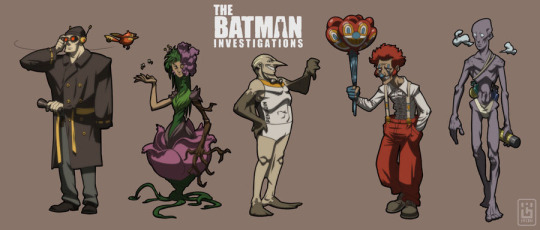
Bruce Wayne was born with high sensitivity to sunlight, keeping him indoors most of the day, and forcing him to wear tinted glasses when not. When his parents were killed by a mugger, the blast from the gunfire damaged his hearing, forcing him to wear hearing aid from an early age.
Bruce had a knack for mechanics, and living off the remaining funds left by his parents, he developed a few surveillance gadgets for police use. While trying to market them for the local police, he was hired by commissioner Gordon as a freelance detective. As his involvement with the force continued, he got the nickname The Batman from his striking appearance.
As a hired gun, his role grew to take on undercover investigations. He could use his equipment to take the cases further than regular detectives could risk, and the police would turn a blind eye to these acts, provided Bruce denied any involvement with the police should he get caught.
His most useful gadget is his mechanic surveillance bird dubbed Robin, used to keep watch on suspects without gathering attention.
This one I think works particularly well for a take on Batman that's more centered around street-level detective work, and I mean actual detective work. A Batman who's strong, but not much of a fighter, and his hearing disability doesn't lend itself to superpowers, it's something he has to work around through allies and gadgets and quick-thinking once he starts getting further into trouble. More of a Sherlockian Batman who contends with the kind of darkness that doesn't come with a status quo to sort itself out.
Now, if we wanna go more along the route of gritty pulp Batman, a more traditional Batman who's actually gonna out there in the night suplexing crime into the sidewalk, what comes to my mind design-wise is something of a cross between Denis Medri's Rockability Batman and Francesco Francavilla's Batman 1972

A Batman who's not exactly wearing a skintight superhero outfit full of gadgets but instead a coat of surprises, who's only really got a mask and goggles to protect his identity and also protect his face. A Batman who's smart and can do detective work, but really he's going out there every night to get the shit kicked out of him until he figures out what he needs to know to solve the case, no police involved. Sort of closer to how Denny Colt or The Moon Man operate, more in the Robin Hood and Zorro molds. This one is also somewhat in line with Golden Age pre-Robin Batman where his main distinguishing feature as a character was how utterly reckless and prone to jumping into a fight he was even by usual comic book/pulp hero standards.
The third option I'm thinking of is to take Batman closer to the superhero he is but still mired in enough pulp ingredients remixed differently to be recognizably different from his ordinary self. So instead I'm thinking to play up respectively the parts of Batman that are The Shadow + Doc Savage, to create Dark Science Batman. This one I think is a better answer as to the question "What would a fusion between The Shadow and Doc Savage look like" than my initial response of a depowered Black Terror, and this Batman would be considerably more inhuman and grandiose in scope than the other two, this would be a Batman who could dominate Justice League meetings by force of personality and create moon bases and contend with dimension-warping supervillains and whatnot.
This one is inspired by a redesign by Arryn Diaz and Dan Schkade's Jack Kirby Batman:
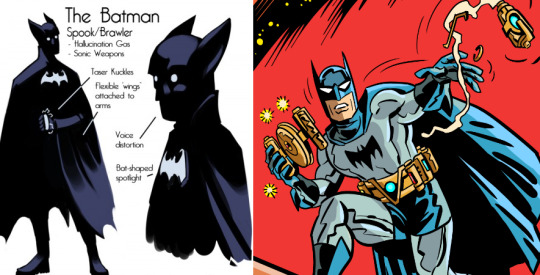
“In a WORLD gone MAD, this lone DETECTO-SCIENTIST must operate OUTSIDE the laws of society in order to defend its FUTURE!! BEWARE — THE BAT-MAN!!!” - Alternate Universe Jack Kirby, 1972
So these are three different directions as to how I think you could do a "Pulp Batman" well, although maybe not necessarily operating by how Earth 20 works. DC already has a billion zillion Batmen as is so I'm sure all these may have already been done at some point in Batman's history.
Of course, realistically speaking if Batman was a long-running and successful pulp hero he could have gone through variations of these depending on the decade, or the country (see: the many global variations of characters attached to the name Fantomas or Zigomar), if not the same narrative arc outright. Pulp heroes are shapeshifters by nature.
#replies tag#dc comics#batman#pulp heroes#earth 20#bruce wayne#kirk langstrom#dan schkade#francesco francavilla#arryn diaz#denis medri#imson
87 notes
·
View notes
Text
Christopher Lee: A Sinister Centenary - Number 11
Welcome to Christopher Lee: A Sinister Centenary! Over the course of May, I will be counting down My Top 31 Favorite Performances by my favorite actor, the late, great Sir Christopher Lee, in honor of his 100th Birthday. Although this fine actor left us a few years ago, his legacy endures, and this countdown is a tribute to said legacy! Today’s Subject, My 11th Favorite Christopher Lee Performance: Mycroft Holmes, from The Private Life of Sherlock Holmes.
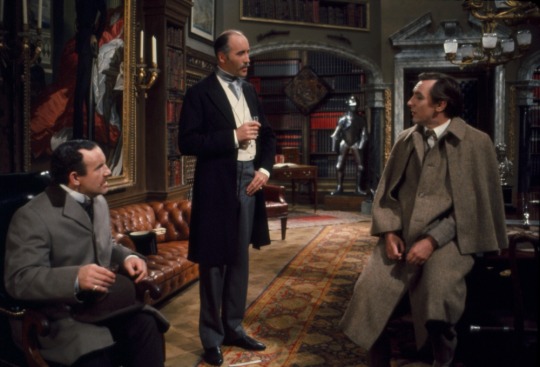
Question: who here likes “Sherlock” or “Moriarty the Patriot”? Or both, for that matter? If you do…(points to the above picture)…this actor. This role. This movie. You have them to thank for the gloriousness of Mycroft Holmes in both those incarnations, as well as a few more. I mentioned Lee’s role as Mycroft in an earlier choice on the countdown, and I also briefly spoke of him a year ago in my “Ele-May-ntary” countdown, where I discussed various takes on Sherlock Holmes. Now, it’s time to give him the limelight. “The Private Life of Sherlock Holmes” was a sort of “dramedy” created by Billy Wilder. The film took a more humorous but also more personal and unique look into the character of Sherlock Holmes, purposefully playing with layers to some of the major players of the stories that had not been toyed with before. Chief among them was Christopher Lee in the role of Mycroft. In the original books, Mycroft only appears twice, and is mentioned a handful of other times. Up until Lee took on the role in this 1970 release, the character was not exactly a household name. It was Lee who, in many ways, created the Mycroft we know today in more modern incarnations, and allowed the character to become much more prominent in future Sherlock Holmes outings. Mycroft is actually only present in the film for a few scenes, but these scenes are fairly lengthy and the character is highly involved in the plot of the picture. What is most influential about Lee’s Mycroft, however, is his personality and overall portrayal: in the books, Mycroft is largely a comical figure. His now famous role of essentially “BEING the British Government” – head of its military intelligence, second only to the Queen and the Prime Minister on the power level, aware of seemingly everything going on in the country and how its run – is really just a backdrop. He is not a buffoon, but he is clownish in a sort of pompous, blustering way; a loveable figure. This is not the case in “Private Life”: Mycroft here is depicted as having a strong sibling rivalry with Sherlock, and is given a much more steely personality. While not totally unlikeable, as he does care about his brother, and is ultimately just trying to do what he thinks is best, he is an authoritarian figure full of secrets, whom not even the Master Detective – his own flesh and blood – can fully trust at all times. His role in the government is greatly expanded upon, and becomes a focal point for his character. He still has funny moments, given that this movie is largely comedic in tone, but he’s no longer a jovial caricature. He is whiplike, dangerous, but has his soft edges. This is really the Mycroft so many have come to love, portrayed by people like Mark Gatiss and J. Michael Tatum: a figure of power, not fun and games. And even for portrayals that veer more towards the comic, such as Stephen Fry or Charles Gray, the size of the character’s role in those versions, and the emphasis on his power in politics and economy, is undeniably influenced by Lee’s turn in the part. For Lee himself, this role was a breath of fresh air. Lee would forever go on to state that Wilder was one of his favorite directors he ever worked with, partially because the man gave him a chance he hadn’t gotten from so many others. Keep in mind, in 1970, Lee appeared in no less than four Dracula movies all in the span of the same year, and he was also balancing Fu Manchu and many other past and present horror movie roles at the same time. Wilder told Lee he didn’t care about any of that, and the actor saw this as another opportunity to show his range and work on something a little different. For fans of Sherlock Holmes ever since then, I think we’re all glad this chance came about. We’re moving into the Top 10, everyone! The end draws ever nearer…tomorrow, I present my choice for Number 10!
#sinister centenary#christopher lee#top 31 christopher lee performances#happy birthday christopher lee#best#favorites#list#countdown#may special#number 11#mycroft#mycroft holmes#the private life of sherlock holmes#sherlock holmes
12 notes
·
View notes
Text
The lying liars who lie
Years and years late to the party, I’ve finally gotten my hands on all the DVDs of BBC Sherlock, and I thought it would be fun to watch the extra material carefully, one piece after another, and also listen to at least some of the show makers’ commentary of the episodes. But at this point, after S4 where DVDs seemed to be a constant lying device in general, I tend to look at them with a bit more suspicious eyes...
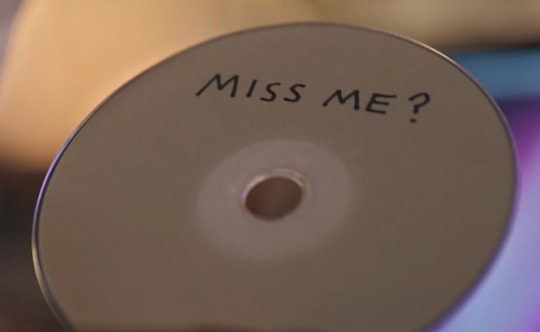
I still love the show of course, but now that I’ve taken this deep dive into all the special features, I find them a truly hard thing to try to wrap my head around. Even this long after the fact, I’m amazed by the amount of shameless, self-congratulatory BS in the DVDs, where the people involved can’t have enough of complimenting each other and their show, while they skillfully avoid to discuss anything actually meaningful about the plot line. ;) For example, Moffat claims in the S2 DVD that “In fact, you’ll never see a more obsessively authentic version of Sherlock Holmes than this one”. But if we follow their light-hearted commentary, which basically takes the show at face value, I’d call that not just hyperbole, but an outright lie. If you want to see the ‘authentic’ stories from ACD’s work in this show, you’ll definitely need to go much deeper into the subtext and meta levels - neither of which are mentioned on these DVDs of course. Here’s my own (rather subjective) ‘review’ of the whole thing, trying to pinpoint why I view most of the commentary of the show from its own makers as an advanced art of deception.
(My musings under the cut)
Series 1 - a wealth of extra material
First of all - as many of you probably knew already - the whole of the Unaired Pilot is added to the DVD of S1. In the extra material about the making of the series, they (Sue Vertue, Mofftiss and others) talk about what things they changed between the Pilot and ASiP, claiming that many changes were necessary improvements once they knew that they had a whole series and a lot more time at their disposal.
Which I can perfectly understand and agree with in general. But I think what’s missing in their discussions is more interesting than what’s actually there (”Mind the gap” ;) ). Things that I would expect from the show makers when they go to the trouble of comparing the pilot version with the aired product. There’s not a word, for example, about the fact that they added both Mycroft and Moriarty to the story in ASiP - two characters who later turn out to play major roles and appear in almost every other episode until the end of TFP. Or about the choice that one of the screenwriters would play Mycroft.
Neither do they discuss why they chose to relocate the place where Sherlock was challenged by the cabbie from 221B to Roland Kerr’s School of Further Education. Instead they focus on the details, like for example the new design of the interior of 221B.
Not to mention the fact that almost every scene in the Pilot is mirrored in ASiP (as pointed out long ago by @kateis-cakeis X), but at Angelo’s in the Pilot Sherlock follows the events with the cabbie while looking in an actual mirror. I even noticed that in the Pilot the cabbie is offering Sherlock dark-coloured bottles with the pills in them, while in ASiP those bottles are transparent, as if the cabbie is offering Sherlock to play Black or White in the chess game that he is simulating. What’s with all these mirrors, though? Not a word on the DVD... ;)
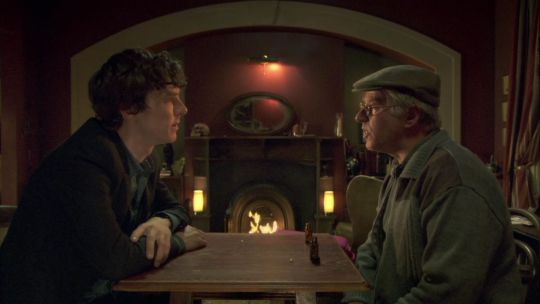
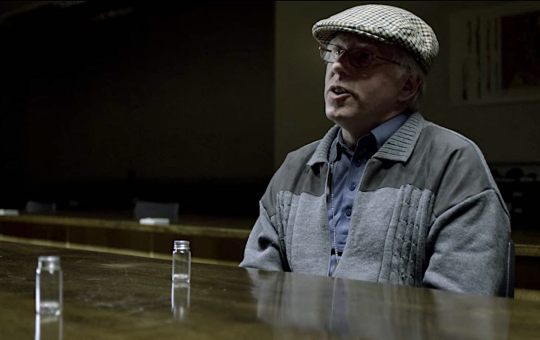
Now, even though these rather remarkable choices are neglected together with a great bunch of minor ones, I still think that the most interesting fact about all this is that they actually included the whole pilot version within this DVD, which is sold by the franchise. Why even do this, when it raises far more questions than it answers? The only logical reason I can come up with is that they’re laying out a track of little hints that anyone with a deep enough interest in the show to actually buy the DVDs can try to follow. And it seems to me that lying by omission is one of the first steps in the long line of cryptic and misleading author comments on this show. But at the same time, they clearly want the fans to have access to it all, even the abandoned version.
Moving on to Series 2, time for bigger lies
In the extra material of this DVD Benedict himself describes how his character "faces one of his deadliest enemies in the shape of Love, and it comes in the form of Irene Adler, who is this extraordinary dominatrix [insert here a bunch of superlatives regarding Adler]...”. And then we see how Adler whips Sherlock with a riding crop (without any kind of consent, I have to add) while he’s lying on the floor, and we have Lara Pulver telling us how it was to have a go at Benedict on set. So Holmes whips dead bodies and Adler whips living; seems like a match made in hell! :))
Gatiss claims, grinning with his whole face, that “they’re clearly, absolutely made for each other”. OK, so I think we can see Sherlock being intellectually impressed by Adler, and even trying to protect her from Mycroft, and we can see John acting jealously. We can also see her being dressed and styled as a perfect, female mirror of Sherlock. But I’m still at a loss what all this has to do with love on Sherlock’s part? Especially since he’s not even responding in any fashion to her various attempts at seducing him.
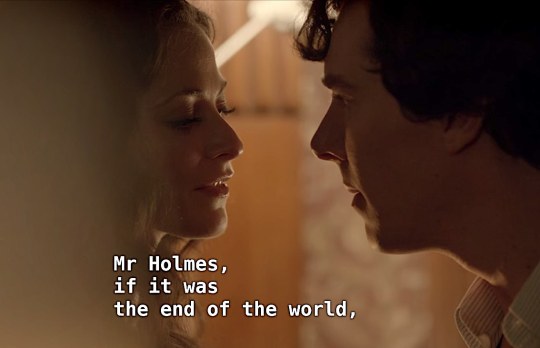
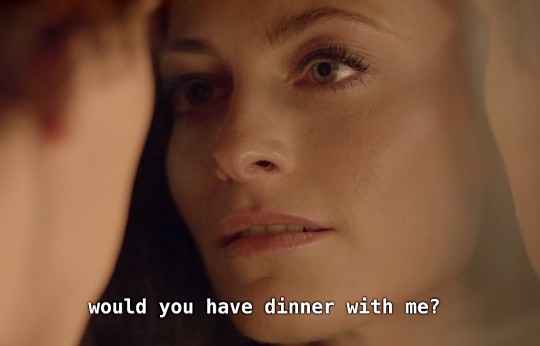
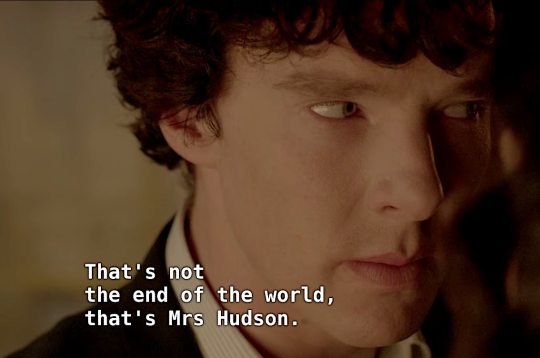
And there’s more: Paul McGuigan, the director of ASiB, claims that the scene where Sherlock has a conversation with Adler inside his Mind Palace about the crime case with the car that backfires "is a part of a kind of love story, if you like...” No, I don’t. Maybe it’s just me, but if their aim really was to convey to their audience a love story between Sherlock and The Woman, I think they failed miserably. All I see is a guy ’mansplaining’ to a clever woman how to use her brain, while she’s trying to flirt with him by expressing her admiration (to no avail, though) and make deductions at the same time. Nothing new under the sun, really. John did the same thing repeatedly in ASiP (without making own deductions) and got far more attention from Sherlock, but I’ve never heard any of the show makers call that ”a love story”. But by ’lie-splaining’ the scene with Irene to the audience, they try to manipulate us all to see it as such...
In all the direct commentary of this episode, where Steven, Mark, Sue, Benedict and Lara are present, I get the impression that every time they even touch on the relationship between Sherlock and John, they hurry to add the term “friendship” or “man love” or similar words in case they forgot them at first, avoiding even the tiniest possibility that there could be anything more going on between them. They even explain that when Irene calls them “a couple” she does not mean anything romantic. This whole approach feels almost paranoic in the midst of all the laid-back jokes and light-hearted talk about the filming. It’s as if a sort of restrictive, heteronormative filter or blanket is being constantly applied, to teach the audience the ‘no homo’ lesson of it all. And the more I listen to this, the more tiresome it becomes.
In the commentary Moffat does reveal an interesting detail, though: that the ‘Flight of the Dead’ in ASiB was inspired by a cut out scene in the Bond movie On Her Majesty's Secret Service. To me this is just one more reason to question the ‘authentic’ quality of this scene, as opposed to possibly taking place in Sherlock’s Mind Palace. But I digress...
Listening to the commentary in general, it’s like it’s aimed to distract the attention from what’s going on at the screen rather than highlight it and try to explain their intentions. They do mention that Irene didn’t actually ‘beat’ Sherlock in the end of ASiB, but there’s no explanation of this obvious deviation from canon, where Adler does indeed fool Holmes, taking advantage of his prejudices.
The rest of the extra material of S2 is mostly about technical stuff, special effects and such, and also about filming techniques and Benedict’s delivery of fast deductions. But the part I really do love is the one where Andrew Scott talks about how much he enjoyed playing the scene where Moriarty dances before breaking into the Crown Jewels. That’s one of my favorite scenes of he whole show. :) Also, the takeaway message from this DVD is Moffat’s words at the end:
“These are still the formative years of Sherlock Holmes, and the most important thing about this series is not that it’s updated; it’s the fact that those two men are still young and they’re still at the beginning of what they don’t yet know is gonna be a lifelong partnership”.
And then comes Series 3...
...and its extra material, with the most blatant attempts at deception so far, I believe. At this point Sherlock is called a “psychopath” by both the show’s characters, John’s blog, Benedict Cumberbatch and Martin Freeman as if it were true, which is a big deviation from ACD canon. That simply doesn’t happen there; while Holmes is sometimes described as eccentric, no one in the books is ever claiming that Sherlock Holmes has some kind of mental illness leaning towards cruelty and egotism - not even his enemies say this about him. In the show, however, they begin in ASiP with making him torture a dying man for information (something that is not included in the Pilot). And in S3, where they avoid discussing the reason why they turned Mary Morstan into a ruthless assassin, this major shift is glossed over by the fact that in the same episode (HLV) they also turn Sherlock into a murderer, who cold-bloodedly blows the brains out of a blackmailer for threatening to make said assassin’s crimes public.
But without ever getting into the “why” of it all, the cast and crew seem overly happy and smiling describing these rather morbid choices as something positive; “fantastic”, "fresh and new” and "amazing” are their choice of words. Benedict claims that Mary, who has literally shot and almost killed Sherlock in HLV, is now "a new best friend of Sherlock’s”. Amanda claims that Mary “is protecting John” when she shoots Sherlock in the chest. Now they’re both psychopaths, and poor little John is forced to stomach them both because he’s addicted to danger. In Amanda’s words, Mary also “kind of gets in between the two of them, but she wants them to be together as well”. Which is a load of BS considering that Mary tries to kill the protagonist of the story.
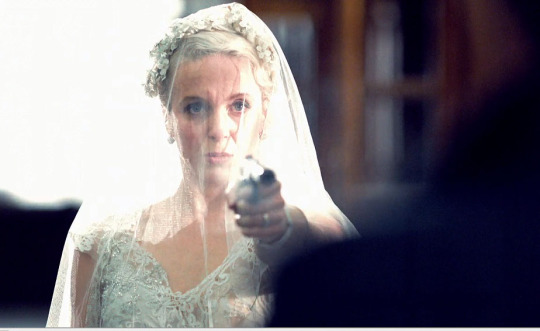
Lars Mikkelsen thinks it’s “such a good script” because “you’re mislead as an audience”. But he never gets the chance to expand on what the misleading actually contains, because then Mofftiss cut in to express how much they love playing with “what ifs”. As if this whole mega-budget project of a show were just a big experimental playground without any actual story to tell.
Benedict repeats his line from HLV that Magnussen “preys on people who are different” and Moffat also says he “exploits people who are different”. Which is really confusing, considering what we can see Magnussen actually do in the show. Lady Smallwood and John Garvie are two well-established, powerful governmental politicians whom Magnussen blackmails by finding their respective pressure points. In Garvie’s case his pressure point seems to be alcohol problems in his past, but according to media he’s later arrested on charges of corruption. Lady Smallwood is blackmailed on the basis of her husband having sent compromising letters to a minor many years ago, in spite of later claiming that he thought she was older and stopped when he found out the truth. And then Magnussen is blackmailing an assassin who recently threatened to execute him but shot Sherlock Holmes instead, in order to try to get at Sherlock’s brother Mycroft, another powerful governmental figure.
But what does media seeking out dirt on certain people in power and their families have to do with “people who are different”? Despicable as the method may be, isn’t this unfortunately how political power play usually works in our society? Or are TPTB somehow a repressed minority group now? Unless this whole “people who are different” accusation is actually about something entirely different, something that none of the show makers even cares to mention... ;)
In these DVDs, none of the involved persons is ever discussing the change of roles with regards to canon, though, or the (lack of) logics in this turn of events, or even a hint about the narrative motivation behind them. It’s all about the great Drama, the extraordinary visual effects and the aim to endlessly “surprise the audience”. Which is fine by me to a certain extent, but when this is all that’s being said, it feels extremely superficial, as if the audience is merely seen as a bunch of consumers that have to be triggered more and more by horror, special effects and cliff hangers to be able to appreciate the show. (“Warm paste” indeed, like Gatiss has later criticized some viewers of wanting...) While the "why”; the idea behind this surrealistic adaptation, made by self-proclaimed fanboys of ACD, is not even touched upon. Around this, the silence is total and therefore totally confusing.
Maybe I shouldn’t even go into Series 4...
...but why not, since I’ve already started? :)
First of all, there’s a lot of extra material on this DVD and I particularly love the parts about the music and composing and Arwel Wyn Jones’ work with the design and build-up of John’s and Mary’s flat and the interior of 221B. Those bits are truly enjoyable. What I could live without, though, is the leading commentary that kind of instructs us, the audience, how we should interpret the show.
Benedict is on it again on this DVD, telling us that in TST they picked up where they left off in S3 and “It’s a very happy unit of three people that then become four.” Why does he feel the need to make this statement, considering how S3 ended? Actually, if there’s anything I totally fail to see in S4, it’s happiness. The banter between the three of them may seem entertaining for a while, but who could have a relaxed, warm relationship with someone who tried and almost succeeded to kill you less than a year ago? Without any sign of remorse? Now there’s a dark tone of discomfort and mean jokes that feels forced and not even a bit happy to me.
But Martin tells us how excited John and Mary are about starting a family and Amanda mentions how much they’re looking forward to the baby. Again and again it’s repeated, as though trying to rub it in: “they’re in a good place, they’re a loving, married couple”. Yeah, right - a child that (judging by TSoT) wasn’t at all planned and now with an assassin for a mother... Twice we see the new parents complain that their daughter has the mark of Satan on her forehead and debate which horror movie she’s from. The clichéd hypocrisy of it all is sickening, and I’m willing to bet that it’s really meant to be. ;)
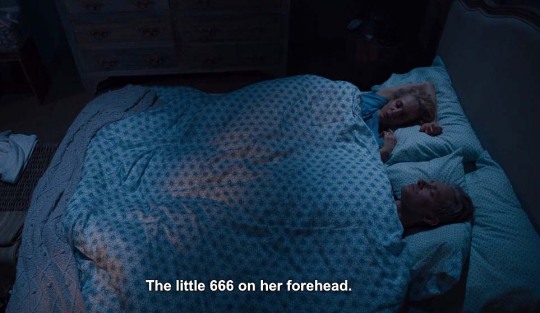
But Gatiss chimes in, deciding for us all that the christening of Rosie is “a funny scene” and “they’re enjoying each other, enjoying being on adventures as a three”.
An interesting detail is that Gatiss also tells us that the working name of this episode was “The Adventure of the Melting power Ranger”. So this little blue guy was that important? :) And - even more interesting - is when he says: “Cake is now the code for violent death”. So how should we interpret Sherlock, John and Molly going out to have cake in TLD then, on Sherlock’s (supposed) birthday?
These might be jokes, though, but when they tell us that Sue cries every time she sees Mary’s death I strongly believe they must be joking. How could anyone feel truly moved by this overly sentimental long monologue where far more efforts are put into reacting to Mary’s speech than saving her life? And John’s mooing like a cow, is that also moving? :)
One thing Martin says about TLD that actually disgusts me is regarding the morgue scene where John assaults Sherlock and Sherlock lets it happen: “From there, really, their relationship can only sort of rebuild, that’s the absolute worst it can get”. As if outright physical abuse would be something that makes you want to rebuild a relationship? Wow - just wow... How far can they go with this crap?
Anyway, when we finally arrive at the absurdity of TFP and Sherlock’s ‘secret sister’, everything is of course discussed as if she actually does exist on the given premises, and everything she does is ‘real’, no matter how impossible it would be in real life. The abandonment of any attempt to have the story line make logical sense is skillfully covered up by more distraction with fascinating technicalities of the film making process. This is where Gatiss makes his now almost classic statement that after Sherlock and John jump out of the window at 221B when a grenade explodes there, it’s just “Boop! And they’re fine.”

Of course there’s no serious attempt at explaining this logically. Except perhaps Gatiss claiming that they both landed on Speedy’s awning - whatever good that would do to them, since the awning is leaning downwards, but never mind... But we never even saw that happen, did we? A great deal of time is then dedicated to show all the precautions to have Martin and Ben jumping safely at low level onto a madras supported by empty cardboard boxes.
Sian Brooke did say something interesting about Sherrinford, however, that got me thinking. She said that Eurus “wants revenge for the years and years that she has been held captive” there, isolated, and that in TFP the Holmes children are now “lab rats” and “it’s an experiment”. On a meta level, I think we can indeed see this episode - and maybe the whole show - as a kind of experiment, but maybe we, the audience, are also lab rats? Since Sherrinford is slightly shaped like a film camera (not commented in the extra material, of course), it leads my thought to all the adaptations through the years and years where Holmes and Watson have not been allowed to be together. A whole century when Sherlock Holmes has been held captive, restricted by the very same sort of heteronormative filter that all this extra material imposes; it’s like Sherrinford, isn’t it? Which gives all the more meaning to Moriarty’s arrival to the island, accompanied by Freddy Mercury’s “I want to break free”...
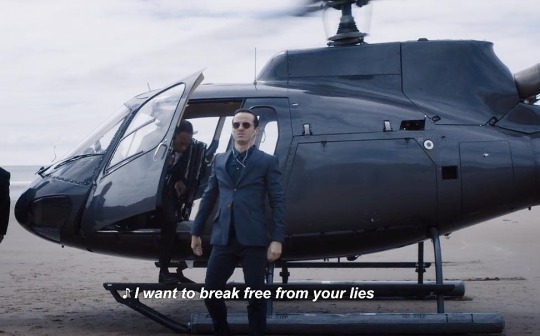
I think I’ll let the final words in this little exposé come from Mark Gatiss in The Writers’ Chat (my bolding):
“Moriarty is a fascinating thing in that in our sea of ongoing lies, one thing we’ve genuinely been completely consistent about is telling people he’s dead. But no-one believes it! And it’s a rather brilliant thing.” Again - self-congratulatory statements. But instead of providing some actual evidence of the death of this character, who has kept popping up in almost every episode since his supposed demise, they think that the more a confirmed liar repeats something, the truer it gets? And the more we’re supposed to believe them? Well, all we can do is wait and see. :)
Tagging some people who might be interested:
@raggedyblue @ebaeschnbliah @sarahthecoat @gosherlocked @lukessense @sagestreet @thepersianslipper
My earlier meta on a similar topic (X)
225 notes
·
View notes
Text
For some reason people really seem to dig this AU so have some more thoughts I had today:
What is Phil's end goal? Wouldn't his parents find out eventually? Yes, but his plan is to have his antique shop up and running and so successful that he'll have enough money to pay for his daily needs + save up the vast sum that his parents spend to send him to school and fund him for a few years. He will then gently break the news to them and give them all their money back as if it were a loan, advising them to leave the estate to his younger sibling/a nephew/other family. That way he's no longer reliant on their money and they can't say he owes them.
Will they be pissed? Definitely. The worst case outcome of this would be that they would completely refuse to speak to him again, which would hurt Phil since he does still love his family, strained as the relationship is. But it's a hurt he's willing to swallow if it means avoiding the golden cage they want to place him in and he'd definitely be miserable with. The best case outcome is that after seething for a bit, they realize Phil is an independent young adult and they can't dissuade him, so they accept his decision, and maybe even come to see the upsides of having a rich son in London with connections 👀👀👀 It is very fashionable...
Techno in this AU is very inspired by Sherlock Holmes (the accurate book version, my beloved), especially in how he's perceived by other characters. Somebody who is eccentric and doesn't care for social conventions and is bluntly honest to the point of rudeness/sarcasm in a way that rubs high society wrong, but in actuality, he's really passionate about the things he does care about and really ride or die for the people he loves, he's just weird about how he expresses his emotions sometimes, making him accidentally come across as cold or standoffish and other times obsessively concerned with specific things to an unsettling degree.
Overall he doesn't care what other people think of him and that is his biggest 'offense' to the average gentleman in Victorian-era England to be honest (in conjunction with like, being born poor lol. Some crimes can never be forgiven /j).
Somebody did mention detective work in the tags and I do think solving crimes/mysteries is one of the many things Techno does do for people, he just applies himself more broadly than Holmes does to other things beyond mystery solving, being more about 'problem solving' in general minus the mystery element. Private investigating would be one of the things he'll do for hire, just not the only one by far. He's also motivated by money and flexing on the aristocracy specifically rather than a more nebulous boredom.
So in other words, some similarities with Sherlock Holmes for sure because I also love those books, but lots of differences too.
Phil originally was intent on Techno just forging some papers for him and maybe joining one dinner with his parents for fake small talk but Techno gets really invested in making up a whole timeline for their fake friendship where they met in university and shared lodgings together, and how they have to fake a location for the factory and investors, etc and Phil is like "is all of that really necessary, mate?" but it helps the bonding along. It also turns out to be quite useful because Phil's parents are waaaaay more nosey than Phil gave them credit for. They have their work cut out for them.
Kristin in this runs a butcher shop in Whitechapel and is one of Techno's contacts (she definitely is involved in local crime networks too) and Phil falls head over heels for her but also knows his parents would absolutely murder him if he brought a lower class girl over for dinner so he's waiting for that whole antique shop thing to pan out first before he introduces her lmao.
The only other character I currently know a role for and would be really funny to have in this is Quackity, who is from a family that used to be upper class but now is solidly middle class (slipping into lower middle class) because of some unlucky streaks, who lives above his station and desperately tries to cling to his wealth and reputation in the high society circles, and who hates Techno so so very much. Like SO much.
This probably falls under 'niche AU that's only interesting to me because I'm a history nerd' but I think Techno would slay in a Victorian era AU, he'd be like a historian / scholar who goes to fancy gentlemen clubs to beat everybody at poker
258 notes
·
View notes
Note
Who are you taking for tonight, homie?
Had to pull out the laptop and write down my thoughts for this one
Jiri vs Glover - Jiri by (T)KO early.
Can't help but feel we are going to see one of those fights where the older vet (Glover) has finally reached the mountain top thanks to good timing only to have it come crashing down immediately (think Bisping, Shogun, Werdum a bit or what just happened with Donaire and Inoue) because a younger guy with way more tread on the tire just comes and tears him apart. We know Glover is probably going to get hurt cause he does in basically every fight. And unlike basically anyone Glover has fought on his recent stretch, Jiri is a finisher. Not in the Anthony Smith, he's losing til he wins way of being a finisher. He is a 27 finishes in 32 fights type finisher. He's probably going to hurt Glover early. But unlike a Ion Cutelaba, I don't think Jiri lets him off the leash when he does.
Jiri isn't perfect though. He can be hurt (Reyes did). He can be stopped (King Mo did). Who knows how he looks in a fight with a 3rd, 4th, and 5th round? There's a solid path to victory for Glover if he survives early but you have got to think those come from behind performances have got to end at one point.
Shevchenko vs Santos - Shevchenko by UD (or 4th or 5th round tko). You have no idea how much I want to pick Santos, because I believe in the chaos that this sport throws out there. Normally when there's an upset in the women's divisions for titles, I can see the path. Wrote about it for Holm-Rousey, Joanna-Rose, Andrade-Rose 1, Rose-Esparza 2, and comically enough Pena-Nunes (years and years before the fight was made). But there were clear weaknesses that the upstart in all those fights could leverage for big wins, normally centered around a perceived weakness in the champ.
I like Santos. I think she's a good example of a fighter who got UFC money and dedicated herself to becoming a complete MMA fighter. She has 0 of the strengths any of those other women possess. She's not particularly brilliant in any facet of the game. While she is generally big and strong for 125lbs, she doesn't hold that edge over Valentina. The only way I can see Santos taking this is if we get a worse version of Shevchenko-Nunes 2 with Santos pressuring but refusing to throw giving Shevchenko nothing to counter for 25 minutes. Smarter people than me have pointed out some of Santos' similarities to Nunes, but I don' t think they factor in that Shevchenko-Nunes 1 was a brutal fight for both women involved that played into how the rematch went.
Zhang vs Joanna - Taking Zhang, UD or early stoppage.
There's so many weird caveats to this fight. If this fight had happened immediately after their first fight, I think I would have picked JJ cause she had the greater technical depth to make the adjustments she needed to win a rematch. Shorten exchanges, less kicking (or kicking upstairs more instead of to the leg). Really take away the big power counters that won Zhang their first fight. But Joanna hasn't fought since the last time these two fought, two years ago. And while Zhang is 0-2 in the meantime, she arguably beat Rose the 2nd time they fought and has looked physically well put together. Joanna is 34 and has been in so many brutal fights (Gadelha 2, Letournau, KK, Rose 1+2, and the Zhang fight). Has the two years helped her recover from that string of wars? Is she going to come back flat? She can't afford that in 3 round fight.
My main worry for Zhang is that the KO loss to Rose has shook her striking confidence and she'll be reluctant to get into a firefight when that's the fight she needs to beat JJ. But I'm honestly more worried about what JJ looks like at this point and should this turn into a battle of wills, I think Zhang can tough that out better than JJ at this point.
9 notes
·
View notes
Text
Transcript Lingthusiasm Episode 59: Are you thinking what I'm thinking? Theory of Mind
This is a transcript for Lingthusiasm Episode 59: Are you thinking what I'm thinking? Theory of Mind. It’s been lightly edited for readability. Listen to the episode here or wherever you get your podcasts. Links to studies mentioned and further reading can be found on the Episode 59 show notes page.
[Music]
Gretchen: Welcome to Lingthusiasm, a podcast that’s enthusiastic about linguistics! I’m Gretchen McCulloch.
Lauren: I’m Lauren Gawne. Today we’re getting enthusiastic about whether you’re getting enthusiastic about theory of mind. But first, our most recent bonus episode is on translation in fiction – mostly translating between human languages and non-human languages but all kinds of translation.
Gretchen: You can get access to this translation episode about some books we’ve been reading recently and 50 other bonus episodes by becoming a patron at patreon.com/lingthusiasm. Here’s a bit of a preview into the books we talked about.
Lauren: We talked about Semiosis by Sue Burke, and A Memory Called Empire by Arkady Martine, as well as The Devil Comes Courting by Courtney Milan. And, Gretchen, you have read Native Tongue by Suzette Haden Elgin.
Gretchen: I have finally gotten around to reading Native Tongue, which has been much recommended to me.
Lauren: A classic piece of linguistic sci-fi.
Gretchen: You don’t have to have read any of these books beforehand. We don’t provide plot spoilers, although we’ll talk about some of the things in the setting. It’s fun whether you’ve read any of them or not at all. You might end up with some new things to read.
Lauren: You can get access to that episode and all of our bonus episodes at patreon.com/lingthusiasm.
[Music]
Lauren: Gretchen, I’m gonna run an experiment on you.
Gretchen: Okay, I like experiments.
Lauren: Excellent. This one involves a lot of a set up, but it’s great because you can do it. If you are listening along, you can also do the experiment along with us.
Gretchen: Great! What’s our set up?
Lauren: We have Sally and Anne.
Gretchen: Okay.
Lauren: Sally has a basket. Anne has a box. Sally has a marble – Sally with the basket – and she puts her marble into the basket. Then she goes out for a walk. Sally’s not here. But we’ve got a basket with a marble in it.
Gretchen: Sally’s not here. We’ve got her basket with the marble in it. Okay.
Lauren: We’ve got a box, and Anne is still there. Anne takes the marble out of the basket and puts it in the box.
Gretchen: So, now we’ve got a marble in a box.
Lauren: We’ve got the marble in the box. Sally comes back, and Sally wants to play with the marble. Where is Sally going to go to get her marble?
Gretchen: I’m going to deduce – based on the fact that when Sally left the room, she left the marble in the basket – she probably still thinks the marble is in the basket because she’d have no reason to assume that things would’ve changed, and so she’s gonna try the basket first because she doesn’t know that Anne has moved it.
Lauren: That is a perfectly reasonable deduction to make. You are a veritable Sherlock Holmes.
Gretchen: Thank you. Did I pass the test?
Lauren: You did. You completed what is known as the “theory of mind test” because you kept track of what you knew about the situation and what Sally knew about the situation and all the sneakiness that Anne had perpetrated with the marble.
Gretchen: But presumably at some period earlier in my life, when I was a very young child, I might not have passed this test.
Lauren: The ability to correctly articulate what you know about Sally’s likely chances of going to the basket or the box really doesn’t settle into being reliable until 3 or 4 years old – actually being able to articulate what you know about the state of other people’s thinking.
Gretchen: Which feels kind of late because 2-year-olds, 3-year-olds already have quite a bit of language in most cases, and yet this later reasoning about mental states and what different people know about different things comes along later.
Lauren: That’s what the theory of mind test seems to indicate. It is a bit more complex than this. This is something that was run for the first time 30 or 40 years ago. There’s been more work that’s tried to do versions that don’t involve language; they just involve looking. They show that toddlers, 15 months old, are actually maybe better at paying attention to the fact that the marble is in one place or another and what Sally might know a little bit better than they can articulate. It’s something about being able to put it into words that seems to be one of the challenges that takes until, as you say, well into language acquisition to be able to do this task consistently.
Gretchen: This task feels like something that some experimenter set up in a lab, and maybe they had puppets, or maybe they had two different experimenters, and these props feel very psychology-experiment-prop style to me.
Lauren: What do we have in the props department, yeah.
Gretchen: It’s funny. I was reading a different paper about these types of experiments, and there are other ways you can test for theory of mind. One of my either favourite or least favourite, depending on this, is – oh, shall I do it on you?
Lauren: Okay, yes.
Gretchen: I have a box. It’s a small cardboard box. The outside says “Kinder Chocolate Bars” – chocolate things.
Lauren: Great. I’m very compelled by this box.
Gretchen: We have our friend Gavagai, who is also in the room and sees this box with the chocolates on it. Gavagai is called out, suddenly, to leave to go do something else.
Lauren: Bye, Gav.
Gretchen: I open this box, and I show you that inside is not, in fact, chocolates, but it is pencils – coloured pencils.
Lauren: Okay, I was gonna say that’s a bit of a disappointment, but it’s something of a disappointment to me.
Gretchen: They’re coloured pencils, which is something more exciting than graphite pencils. But still, they’re not chocolates. Then I close the box up again, and it looks like it’s closed. Then our friend Gav comes back in the room.
Lauren: Hi, Gav.
Gretchen: What does Gav think is in the box?
Lauren: Well, I know that it’s pencils. But Gav wasn’t here when I saw that it was pencils. Gav still thinks it’s chocolates, and boy, are they in for a disappointment.
Gretchen: Yes, they are. You can do this about location of item, which is the Sally-Anne test, which is about location, or you can do it about identity of item – what’s in it.
Lauren: I have a colleague who’s done the theory of mind task with little stones instead of a marble, but then there’s a whole other twist where the stones end up being those little nuggets of chocolate that look like stones. I just feel like I would be confused by that point about who knows what about the state or location of this rock chocolate situation.
Gretchen: I remember I loved those stones as a child because it felt like you were gonna break a tooth on them, and then you would eat them.
Lauren: You could definitely do some fun false belief with someone about me eating dirt.
Gretchen: There’s also a fun one in this study where they found – and I don’t know where they got this object because I have not seen an object like this – they have this little toy that looks like a race car, like one of those cars that you “vroom vroom” on the table. But it turns out when you press a button on it, it turns into a pen. A pen-thing pops out. They’re trying to see does this person think it’s a race car, do they think it’s a pen. Somebody’s really going around in toy shops being like, “Okay, what here could be deceptive?”
Lauren: Keeping track of people’s knowledge states, as we’ve said, is something that takes a little bit of effort. Not all animals can necessarily do it. In fact, when we find animals that are really good at this, people get really excited. There are animals that are closely related to humans, like chimps seem pretty good at this. You can basically do a version of the location of an object thing, and the chimps are all over it. Also, ravens are really good at conceptualising where someone might be and what they might be doing. It’s one of those skills that isn’t just like – well, first of all, you get theory of mind and a bunch of other things, and then you get language. It’s not just an ingredient in the language cake. It’s just one of many skills that humans and animals closely related to humans seem to have but also is scattered throughout the animal kingdom.
Gretchen: Corvids are pretty smart, I guess. They can recognise people, so maybe they can also – if you feed them, they’ll become your friends.
Lauren: We’ve run a very classic theory of mind experiment at the top of this episode, but as we suggested, people have been pulling apart exactly what theory of mind is and how different people do different elements of it. It seems to be this complicated cluster of features around attention, attention-tracking, false belief, mental states, and being able to do all of this is part of being able to do the social element of language.
Gretchen: Because when you’re talking about language, you’re describing what other people have done. You’re thinking like, “Okay, why did this person behave this weird way this time?”, or “Why did this person do this thing to me?”, “Why can’t I get this?” You’re trying to figure out, well, it’s because this other person wants this thing even though that’s not what I want. Or it’s because this other person knows this thing even though it’s not what I know.
Lauren: Even just the process of asking a question, like, using language to interact with someone to try and get to an end goal and whether or not they are likely to have the right information that I need to get this question answered. Theory of mind is the having really good foundations on the house of language, and it’s part of why I’m always very zen when people talk about computers taking over the ability to do language. It’s like, well, first of all, a computer has to be able to keep track of their best guess of the knowledge state of everyone else in the interaction, and that’s not necessarily the same kind of programming task as figuring out sounds or morphemes or syntactic structures.
Gretchen: It’s interesting because it is a theory – not like the theory of gravity where scientists have hypothesised that minds might exist – but in the sense that, whenever we’re interacting with the world, we’re hypothesising that the people around us have intention behind what they’re doing, and they’re doing stuff for reasons. I have to hypothesise that you, Lauren, have a mind because I don’t actually have direct evidence that you have a mind. Maybe you have actually been Lauren-bot this entire time!
Lauren: True, true. I am operating under the same premise. I have my own theory. It’s not a shared theory, necessarily. We all have this internal idea that the people we’re interacting with in conversation are also doing the same mental calculation that we are.
Gretchen: I remember having this realisation that people have other mental states, and maybe they conceive of the world dramatically differently from how I do. Maybe this thing that I see that I call “red” isn’t actually what someone else is seeing even though they also call it “red.” I remember having this philosophical realisation when I was about 12 or so, and thinking, “How do we know anything that we’re seeing things.” And yet, even though I don’t have empirical evidence that you aren’t just an extremely sophisticated automaton – I mean, I do have a lot of empirical evidence, actually, because automatons aren’t that good yet – but we still manage to interact with people. We still manage to operate under a working theory that people do have minds and they are interactable with.
Lauren: People have drawn a link between this kind of cognitive foundation and the need for language by looking at the way early human ancestors learnt to socialise with each other. Instead of having small packs of humans, you ended up getting these larger and larger groups. Once you have these larger groups, you have to have some way of maintaining social cohesion that’s not just small-group dominance. Robin Dunbar is probably one the most famous proponents of this idea that language is a way of maintaining social cohesion and that you can keep a happy social relationship with more people essentially through gossip – gossip being one of the mechanisms that helped generate the need for language.
Gretchen: I mean, it’s useful to know can you trust this person because they were trustworthy last time or have they been going around and doing things that are not trustworthy or is this someone that someone else is willing to vouch for. There’s lots of reasons why language can help with cooperation.
Lauren: In the absence of being able to time travel, I quite like this theory of one of the ways that humans came to use language.
Gretchen: I’ve actually been thinking about Robin Dunbar’s theories for a different reason. Because he has this very famous 150-size social group number, which is the size of a lot of villages or small communities or small companies or small conferences. It’s the magic number for that kind of community. But also, there’s this other number that Dunbar and colleagues have also researched, which is four. That’s the number of people that conversations tend to max out at before they start splitting into smaller conversations.
Lauren: Ah, this makes a lot of sense when I think about small group chat at parties and the ebb and flow of when people join or leave conversations. I think that must also explain why trying to have all of your friends in one big video chat room at an online party is really stressful.
Gretchen: Exactly. This also shows up in fiction. It shows up in plays. It shows up in movies that people tend to max out at four conversation participants. The reason for this has to do with theory of mind, which is that we find it too cognitively exhausting to keep track of the mental states of too many people.
Lauren: In a specific conversation.
Gretchen: At once, yeah.
Lauren: So, I can vaguely keep track of, like, 200, 150 people in my social village, but in terms of the moment-to-moment what-do-you-know-about-the-story-I’m-telling, three or four people is enough for me to keep track of.
Gretchen: There’s a really interesting test of this which is that Dunbar and colleagues did an experiment where they asked people to talk about an absent third party and speculate about that absent third party’s mental states. When people were instructed to use that for their conversation, they tended to form one smaller conversational grouping, so maximum of three instead of maximum of four, when they were just asked to talk about what the absent third parties were doing but not what they were thinking.
Lauren: I’m deeply fascinated by – this is experiment is “Please come into this lab and gossip.”
Gretchen: Right. I don’t remember exactly how they set it up, but yeah, something about the maximum number of mental states that you can conceive of without getting too tired is around five, but that means four people because you’re also keeping track of, like, between you and me, we have three mental states. I’m thinking about me, I’m thinking about you, and then I’m also thinking about what you’re thinking about me.
Lauren: This is why the language that we use to talk about internal mental states does particularly interesting things in grammar. You begin to see theory of mind affect the way that we do grammar because verbs that express internal mental states act a bit differently to other verbs.
Gretchen: English actually has this interesting grammatical distinction between how we talk about mental state verbs versus action verbs in the present tense. We say something like, “I know,” “I like,” “I understand,” “I enjoy,” “I fear,” but for action verbs, we’re more likely to say something like, “I am running,” “I am walking,” “I am talking.”
Lauren: Oh, yeah, “I walk,” implies an “I walk every day” habit thing.
Gretchen: Right. Whereas “I know” doesn’t imply “I know every day.” There’s just this subtle distinction between how we talk about verbs in the present. In the past, we don’t do this. You can say “I liked” and “I walked,” and that’s the same, but in the present, we have this interesting distinction that’s made in English that isn’t necessarily made in other languages.
Lauren: That only really works for first person in English. It’s a bit weird to say this about other people, especially the person who you’re talking to.
Gretchen: It’s another thing that’s weird about verbs about mental states where it’s sort of weird for me to be like, “Lauren, you like cake.” I mean, I guess –
Lauren: I mean, you definitely have enough evidence to support that as a viable statement. I think in the context of us interacting, it would be fine, but it would very weird to say it to someone who you didn’t have that knowledge for.
Gretchen: If I just go up to someone in a coffee shop who’s eating cake and say, “You like cake,” it’d be like, “Excuse me, but who invited your opinion here?”
Lauren: I think this is one of the things I’ve had to learn in teaching over the years is it’s very easy for me to be like, “Well, you know this because we covered it in class last week.” I just assume that everything we covered in class is completely absorbed into your knowledge state.
Gretchen: You mean your students don’t have perfect downloads of every single, you know, audio file of your voice?
Lauren: In much the same way that we don’t assume that people have absorbed every single fact from Lingthusiasm when we bring them up a couple of years later.
Gretchen: Absolutely. You don’t retain this. It’s easy to be like, “I’ve told you once,” and like, “Yeah, that was years ago, I don’t remember everything that happened to me years ago.”
Lauren: It’s why you end up finding a lot of question forms for second person in verb paradigms when you’re trying to do this elicitation because it’s much more comfortable for people to reframe what you’ve said as a question.
Gretchen: I think when we’re used to doing this decontextualised form of grammar as linguists, we’re like, “Oh, yeah, okay, I can make a verb paradigm: I like; you like; he/she likes; we like; you-plural like; they like.” Yeah, fine, I can just make this little paradigm for me. But the social context in which you would use each of these forms is actually really different.
Lauren: I mean, now that we’ve said that I can definitely think of contexts where it would be fine to say it in English with a direct “You like” or “You know.” I think there’re definitely where it would be safe to say it to a child that you are very close to like, “I know you like toast. We ate toast for breakfast yesterday.” Lo and behold, they like toast. They just need to be reminded of that.
Gretchen: But even there you were like, “I know you like toast,” which is sort of not quite as committed to the statement as “You like toast.” Or if you wanna say to a dog or something like, “You want your dinner? Yes, I know you want your dinner. You’re gonna have your dinner. Here we go.” But it’s, I think, to say to an adult – I mean, maybe if I walk in on you in your office, and I’m like, “Oh, you’re busy. I’ll come back later.” Or like, “Oh, you’re reading. You’re on the phone. I’ll come back later.” There’re certainly contexts in which you could do it, but you have to do a lot more contextual set up.
Lauren: I love how much set up you had to do to get to that as a valid way of using an internal state verb directly at someone.
Gretchen: Whereas if I say, “Yeah, I know. I like cake.” This doesn’t require any set up. This is just the unmarked thing to do.
Lauren: This is why we separate out these verbs about internal mental states or “psych verbs” as they’re sometimes called and look at them separately to other verbs in English. Because talking about someone else’s mental state changes the way that we can use them in grammar.
Gretchen: Some psych verbs come in pairs. You can say “I like cake” or “Cake pleases me.” Or “I fear dogs,” “Dogs frighten me.” In both cases, you’re having the same relationship between the two entities, but the verb flips, which you don’t always see with actions. Sometimes you see it with actions like “I buy this from you,” “You sell it to me.” But it seems to be one of the things that happens with internal mental state verbs.
Lauren: They also tend to have more variation across languages and across cultures as to how you can use them.
Gretchen: Yeah. There’s a really interesting and subtle example of this in English and Spanish where in English it’s less common to say something like “You understand” with the meaning of “I infer you understand based on the evidence of you seeming to understand.” Whereas in Spanish, you have a verb that seems like it should correspond to English “understand,” but it is reasonable to use that verb to mean “I infer you understand because you’re asking really good questions” or “I infer you understand because you are making noises of comprehension and you’re nodding and so on.” It’s reasonable to say to someone “You understand” with the meaning, like, “It seems to me that you understand” or “I observe you to be understanding.”
Lauren: That is a subtle but important meaning distinction, I feel.
Gretchen: I heard this anecdote from a linguist who – I don’t remember which linguist anymore – who said that they’d told this to somebody – an English speaker and a Spanish speaker who were in a marriage together – and they both spoke each other’s languages, but they didn’t have an understanding that this was actually a pragmatic difference between them. Sometimes, they would get in fights by like, “What do you mean you say I understand? You don’t know what’s going on in my internal mental state. You’re just assuming what I know.” Which was actually a systematic pragmatic difference in how the languages use those particular mental state verbs rather than a case of just not understanding between the partners.
Lauren: That is amazing. The thing I find really interesting about that anecdote is that the distinction between the two forms of “understand” was really implicit between the two languages. I’m really interested in those grammatical features where knowledge state becomes very overt. That’s essentially what motivated me to study how we grammatically track source of information, which is the area of evidentiality. We had a whole episode on that that I will not assume you’ve listened to, and I will not assume you remember anything from, but essentially, evidentiality is used to keep track of, depending on the language, whether you know something because you saw it or because someone else told you about it or maybe you’re not entirely certain about it. This is marked as a feature of the grammar rather just being implicit or optional.
Gretchen: In English, you have the option of saying something like, “It’s raining,” “I can see that it’s raining,” “I can guess that it’s raining because I can hear the rain drops,” or because someone’s walked in, and their shoulders and umbrella are all soaking wet. You can say all of those things to indicate the source of your knowledge, but you don’t have to. You could just say “It’s raining” and let someone else figure out how you came to know that information.
Lauren: Whereas if we look at a language like Yolmo in Nepal that I’ve worked with, you can actually see someone’s knowledge state changing throughout the story that they’re telling because maybe they start with talking about something in a way where they’re not certain if this cake is going to be delicious, and then they talk about how someone told them it’s going to be delicious, and then finally, they have direct sensory evidence of how delicious the cake is. You see how the knowledge about the cake being delicious is really clearly marked by the grammatical choices that they have to make throughout the story. It means that I can keep track of someone else’s source of evidence in a way that’s more direct than in English. It means that people are more attentive to mine as well.
Gretchen: So, if you wanna say something like, “I infer that you understand,” you would be doing that with the evidential marker. Or “You told me that you understood this yesterday, so why don’t you understand it today,” then you’d have a lot of ways of marking the differences between those internal mental states.
Lauren: Yes. And those internal state experiences of if someone’s unwell or if someone’s hungry, I have to mark them differently if I don’t have any direct visual evidence. If you’re unwell, and you’re shaking and feverish, I can say that I can see you’re unwell. But if you’re unwell in a way that I can’t see, I have to use other grammatical ways of marking it. How you interact with other people’s internal states varies because sometimes you don’t have access to a direct source of evidence for it.
Gretchen: I feel like I’m just picturing those little cartoons you get in language learning textbooks where they have test very stereotyped representations of common illnesses that don’t have obvious physical things. Like, “I have a headache” would be like a person holding their head in great distress or with a hot water bottle on their head, and you’re like, “I don’t put a hot water bottle on my head when I have a headache.” Or like somebody who has a thermometer sticking out of their mouth or something to indicate these sort of things that aren’t really easily visually represented.
Lauren: It’s because figuring out someone else’s internal state is actually a really complicated cognitive task that we do, and we fall back on these tropes to help us navigate that.
Gretchen: I guess same for teaching other types of mental state verbs, you know, “know” or “understand” or “like” or something. You have these maybe very stereotyped or symbolic representations. If you have someone with a heart or something, maybe they’re liking it or loving it. But it’s difficult to do a picture of “I know,” “I understand.” Not everything is easily visualisable.
Lauren: You talked earlier about how it was a revelation for you at some point that maybe we can’t really know what’s happening in other people’s minds. There is a lot of cultural variation as to how much people are willing to feel like they’re able to intuit the internal states of other people – so much so that there’s a whole area of anthropology that looks at this idea of cultures where it’s really prevalent to assume that you can’t know someone else’s internal state. That’s the starting point for building social interactions.
Gretchen: This is the inverse of the Spanish thing where it’s like, “Yeah, I can infer your mental state.” This is like, “Nobody can really know what anyone else is thinking at all.”
Lauren: It’s a cultural assumption and starting point for building conversations and interactions that I’m gonna assume that I can’t know what your internal state is. I can only make reference to it by very overtly flagging that I don’t know that. I might talk about your actions rather than my assumptions about the thoughts behind those actions.
Gretchen: So, what does it look like in practice if someone’s operating under the assumption that you can never really understand what’s going on in someone else’s mind?
Lauren: A lot of the anthropologists who work in this area tend to look at the domain of gossip. I like to think of it in terms of – it just means that you’re unlikely to have gossip that goes along the lines of “What were they even thinking?” Instead, your gossip is more about the concrete actions of people rather than rationalising their mental state while they were doing those things.
Gretchen: Okay. So, not like, “This person had good intentions, but this thing didn’t work,” or “This person never cares about other people’s feelings, and so therefore…,” but it’s more like, “Oh, this person did this thing – ate my cake.”
Lauren: Yeah. I mean, assuming someone has good intentions is something that presumes that you can know what’s inside someone else’s mind.
Gretchen: It’s like, “This person ate my cake. I don’t care why they did it, but that’s what happened.”
Lauren: That tends to be more of the focus that gets talked about or that people might come upon by using strategies like grammatical evidentiality as a like, “You can’t know what’s in my mind, so let me tell you that I know that it’s raining because someone said or because I saw it.” Like, “Let me do that work for you of telling you my state of knowledge rather than you trying to guess something that you can’t guess.”
Gretchen: So, it’s not necessarily a thing of “We’re not talking about mental states,” but the person is the ultimate authority on their own mental state.
Lauren: Yeah. I think this area of opacity of mind is looking at commonalities between what are actually very different ways of approaching understanding people’s internal states because perhaps culturally we’ve just gone with the assumption that everyone thinks about social interaction the way we do and that maybe there’s a lot of variation there.
Gretchen: Lauren, are you saying we have bad theory of mind about theory of mind?
Lauren: Potentially. But I think learning about theory of mind as a bedrock and then opacity of mind as the way people approach this bedrock has made me more appreciative of keeping track of what people might know or not making assumptions about what people bring to any particular interaction. I really appreciate knowing about theory of mind for that reason.
Gretchen: I think practicing figuring out, okay, what are some possible mental states here, what might be going on. This is one of the things I really like about fiction, especially, reading books is you do get to be behind someone else’s eyes and thinking about what they’re doing and why they’re doing it even if their reasons for doing something are really different from what I would think. I find filmed stuff, unless there’s a lot of voiceover – I love voiceover because you can get into someone’s mind. Not everyone’s a fan of voiceover, but I love it because it gives you that internal mental state. I don’t just wanna look at someone’s face and think, “Oh, this is what they’re thinking.” I wanna be behind their eyes and thinking, “Oh, they actually think this is a good idea. Okay. Well, I’m along for this ride now.”
Lauren: I think fiction is a really great philosophical experiment. It’s one of the reasons I really find sci-fi to be interesting is because it can push the limits of what another mind is or what another mental state is to be thinking in. One thing we didn’t get to in the bonus episode about Arkady Martine’s Memory Called Empire is that there are people who have the capacity to take on the entire previous knowledge state of someone else. I just am like what would an evidential marking system be like for a person who has multiple consciousnesses worth of evidence for a statement.
Gretchen: Like, “I know this because my original consciousness knew this” or “I know this because the consciousness that I got added to mine later in life knows this.” Oh, man.
Lauren: There’re just so many layers of potential knowledge state there. That’s the kind of sci-fi that lets me bring my linguist brain to problems of consciousness.
Gretchen: I’ve been thinking about this from a practical level as well recently which is what’s the point of having a conference compared to just reading some blog posts or something about the same topic. I think it’s about that conferences create a state of shared knowledge among their participants. You know that everyone else was also at the same talks or in the same environment or is interested in the same topic, and so it gives you springboards for having conversations about topics of mutual interest rather than just “I’ve acquired this information.” It’s “I’ve acquired this information in a social context where I’ve also acquired a bunch of people to talk with about it.”
Lauren: I’ve never quite thought of conferences in that way, but that is a very wholesome, linguist-brain way to approach it.
Gretchen: Well, it’s partly why digital conferences can be unsatisfying because if you don’t know who else is in the audience and you don’t have any way of spending time with them then you don’t get to have that shared mental state with the fellow conference participants. You’re just receiving the knowledge in a way that you could do without the conference structure at all.
Lauren: I think that speaks to the way that approaching theory of mind allows you to just be more generous in the way you conceptualise other people’s intentions or their motivations or their actions, which is one thing I really appreciate about it.
Gretchen: I also think that there’s – I mean, this is definitely not in the canon of theory of mind – but it’s part of this thinking and reasoning about other people’s mental states. It’s also what the mental state is that you impose on someone else by reacting to something.
Lauren: Okay. I’m now very conscious about whatever I say in response to this anecdote.
Gretchen: I’m sorry. An example of this is the xkcd comic “Lucky Ten Thousand,” which reads, “I try not to make fun of people for admitting they don’t know things. Because for each thing ‘Everyone knows’ by the time they’re adults, every day there are, on average, 10,000 people in the US hearing about it for the first time.” And there’s some calculations. “If I make fun of people, I train them not tell me when they have these moments. And I miss out on the fun.” Then the little comic strip – this is two people – one says, “Diet Coke and Mentos thing? What’s that?” And the other one says, “Oh, man! C’mon we’re going to the grocery store.” “Why?” “You’re one of today’s lucky ten thousand.” Some of my friend groups have adopted “lucky ten thousand” when someone mentions like “Oh, what is this book?” or “What is this thing?” rather than say “Oh, you haven’t heard of that? What?”
Lauren: I can actually tell you exactly how Gretchen says it because Gretchen said to me when we were preparing for this, “Oh, you haven’t heard of the ‘Lucky Ten Thousand’? Oh my gosh, do I have the link for you.”
Gretchen: [Laughs] Exactly.
Lauren: It was so nice to not feel embarrassed to not know every comic in a canonical webcomic series and to be introduced to this very excellent one.
Gretchen: It makes the conversation happen in a much more positive way because then – you know, nobody’s read all the books. Nobody has done all of the things. You can have the conversation of “Oh, well, what did you like about it?” or “What is interesting about it?” without the shaming version of the conversation of “Why haven’t you done this?” or “What’s wrong with you that you don’t know this thing already?” I think this is a similar thing that happens when you create things as well, like “I wrote a book” or “on this podcast.” Sometimes, we’ll say something there or give some – like, here’s a set of examples or something. And sometimes people will reply, “Oh, I listened to your thing,” “I liked your thing and here is this other example for you.” Like, “Here’s another thing that you might like.” That frame is a really positive way of having that conversation and is something that I can then share with other people and say, “Oh, here’s this other thing that people might be interested in.” I can retweet it. Or “Here’s something else going on.”
Lauren: I always feel bad when people phrase it as though we have deliberately omitted something for nefarious reasons when it’s often just that we have a finite amount of time and there’re many languages.
Gretchen: Also, we don’t know everything. Sometimes, someone tells us about a new example.
Lauren: Sometimes, we get to be one of the lucky ten thousand for a topic in linguistics, and it makes us very happy.
Gretchen: The thing is, is the intentions are generally really good. People are excited to share things. They’re excited to talk about things. It’s just this common way of responding to things that doesn’t end up leading into the conversation that you wanna have and with a slight tweak could totally do that like the “lucky ten thousand thing.
Lauren: I also think about this modelling other people’s mental states and knowledge. I think one of the peak activities for that is creating a forwardable email.
Gretchen: Ooo.
Lauren: For those of us who spend a lot of time on email, occasionally, someone will say, “Cool. I’m glad we’ve agreed to do this thing. Can you put the details in a forwardable email so I can send it to the rest of the group?”
Gretchen: Right. Or “Can you introduce me to this person. Here’s why I think they’d be interested in talking about it.” And I’ll say, “Okay, I’ll write a forwardable email. I can send it to them, and then they can decide if they wanna talk to you,” or something like that.
Lauren: Me and this other person know that this email exchange has happened. I now need to write a single, useful, context-filled email that that person can forward on to the group that they want to do the thing with or someone that I am hoping to be introduced to. It requires me to think about what I know, what the person who asked me to do this email knows, and what this third person, who hasn’t been part of any of the prior conversation but needs all of the relevant context, needs to know. I just think that the mental state modelling involved and the mentalising what this person who hasn’t been part of the conversation needs is like Dunbar’s mental representation stuff as, like, multidimensional chess.
Gretchen: Because you end up saying – like, to the person you’re actually emailing, you’re telling them all of this information they already know, and that’s why you can sometimes specify to someone like, “Oh, yeah, please send me an email that I can forward to this person.” If I’m receiving a forwardable email, I know that you’re repeating information that I know, and it’s not patronising in this context because you know that I know that I’m gonna forward it to this third person who doesn’t know these things and so, therefore, that’s why you’re repeating this information that I already knew. There’s so many levels of understanding what other people are gonna potentially think in there.
Lauren: This is why, before we even get to thinking about language, we have to think about the cognitive processes that allow us to know where the marble is, to know if someone thinks cake is delicious, or to go to put everything into an email.
[Music]
Gretchen: For more Lingthusiasm and links to all the things mentioned in this episode, go to lingthusiasm.com. You can listen to us on Apple Podcast, Google Podcast, Spotify, SoundCloud, YouTube, or wherever else you get your podcasts. You can follow @Lingthusiasm on Twitter, Facebook, Instagram, and Tumblr. You can get IPA scarves, “What the fricative” mugs, and other lingthusiasm merch at lingthusiasm.com/merch. I can be found as @GretchenAMcC on Twitter, my blog is AllThingsLinguistic.com, and my book about internet language is called Because Internet.
Lauren: I tweet and blog as Superlinguo. Have you listened to all the Lingthusiasm episodes, and you wish there were more? You can get access to 54 bonus episodes to listen to right now at patreon.com/lingthusiasm or follow the links from our website. Patrons also get access to our Discord chatroom to talk with other linguistics fans and other rewards as well as helping keep the show ad-free. Recent bonus topics include the linguistics of Pokémon, backchannelling, and translation in fiction. Can’t afford to pledge? That’s okay, too. We also really appreciate it if you can recommend Lingthusiasm to anyone who needs a little more linguistics in their lives.
Gretchen: Lingthusiasm is created and produced by Gretchen McCulloch and Lauren Gawne. Our Senior Producer is Claire Gawne, our Editorial Producer is Sarah Dopierala, and our Production Manager is Liz McCullough, and our music is “Ancient City” by The Triangles.
Lauren: Stay lingthusiastic!
[Music]
📷
This work is licensed under a Creative Commons Attribution-NonCommercial-ShareAlike 4.0 International License.
56 notes
·
View notes
Text
The Psychopath's Crown - Pt. 1
Characters: Jim Moriarty x Holmes!OC
Warnings: None.
Chapter 1: "And you're supposed to be a Holmes."
I strode into Speedy’s, the bell dinging as I swung the door open and made my way over to the table where she was already seated. By she, I mean Eve Watson. Best friend and partner in crime. Well, not quite a partner in crime considering she’s a DI. A smile tilts my lips at the thought as I sit down next to her. She says, gesturing to the waitress bringing over two drinks but not raising her eyes from the newspaper.
“I ordered what you need,
Her lips turned up ever so slightly at the sight of me.
I smile gratefully as I accept the steaming cup of chamomile. As I sip it, I remark, “I suppose I didn’t apply my concealer well enough, did I.”
She replies, turning a page of the newspaper, “I might not be a Holmes but I have picked up a few tricks. You’re clearly stressed out to an observant eye.”
I merely shrug at her words, cupping both my hands around the cup for warmth, “I do quite a lot of work. Mycroft has it worse though.”
At the mention of my elder brother she snorts, finally laying down her newspaper.
“Please. I don’t see Mycroft with dark circles under his eyes and paler than usual skin.”
I retort, placing my cup down gently just as the waitress arrived with Eve’s order, “You don’t see Mycroft at all. With good reason, placed in a room together with no supervision you two wouldn’t last a day.”
She shrugs as well, accepting the truth of what I said.
I plunge onwards, not letting her speak, “So I had a proposition.”
She arches an eyebrow and I finish, “We could move in together.”
She says monotonously, her voice dripping with sarcasm, “I wasn’t aware that our relationship had become so serious. Whatever shall I tell Greg?”
I sigh, “I found recording devices in my home and even though I dismantled them, Mycroft refuses to let me live alone and as much as I love my brother I appreciate my freedom. If I moved in with Myc, my life would be very restricted. So, as an alternative, I’d rather live with you.”
As I finish explaining she thoughtfully stirs her matcha before she says, “Well, if that’s the case then sure. I’ll have someone help with your stuff. Just don’t take my room. There’s plenty of others.”
I instinctively lean forward to hug her, forgetting the table and letting out a small “oof” as I bump into it.
She snickers, “And you’re supposed to be a Holmes.”
I roll my eyes and stand up, “You wanted me to meet someone?”
She nods, standing up as well, “My brother, John Watson. He can be a little-”
I complete her sentence, “Overwhelmingly flirtatious?”
She nods again as we exit the cafe, “My brother flirts with every single nice girl he meets. It’s weird. But he’s living with Sherl so you’ll have to get used to seeing him more often..”
I reply as we enter 221, “Oh, I know he’s living with Sherl.”
At the look she gives me I say quickly, “Mycroft’s surveillance, don’t ask. And also, how are you two related again? He’s flirtatious and you despise PDA, even between friends.”
She replies simply, “He’s my brother.”
I refrain from rolling my eyes again and instead rap on the door to 221B, “Sherlock! Open up.”
A man with short blondish hair opened the door, looking rather confused when he saw me but he seemed to realize something as his eyes darted to Eve.
“This is who you wanted me to meet?” He asks her.
She merely says, “I got her along, didn’t I?” She pushes him out of her way and goes straight to the refrigerator.
I chuckle and step in as he stands aside. He starts speaking first, “So, Eve didn’t bother to mention your name?”
I answer with a small smile, “Emberlyn. I go by Emberlyn.”
He smiles as well, “Beautiful name, beautiful woman.”
Flirtatious, indeed. He’s barely known me for five minutes. I hold back a chuckle when I realise he probably doesn’t know I’m related to his flatmate.
As if on cue, Sherlock strides in, his pale blue robe billowing as he walks, “Where’s Eve?”
I point to the kitchen, and he seems to realize I”m here, “Oh, hello sister. John, I’d recommend not flirting with her unless you want an earful from Mycroft. You might even get maimed if you’re lucky.”
Eve adds, peeking out of the kitchen, at John’s incredulous look, “Mhm. Just try not to hook up with her.”
I finally let a laugh bubble out, “I forgot to mention, My full name is actually Charlotte Emberlyn Tara Holmes. Bit of a mouthful so I go by Emberlyn.”
John continues to gape at me for a moment and before I can register anything else there’s a blast. I’m thrown off my feet and backwards almost headfirst into the fireplace. I feel a ringing in my ears as I stand up and stumble towards the kitchen, “Eve? Sherlock? Are you alright?”
Worry seeps through my voice despite myself and I see that Eve is just now getting up with a wince. Sherlock has already dusted himself off and extended an arm to help her up. She stands up with a small groan and I see red contusions on her elbows.
I murmur slightly, my ears still ringing, “That is going to bruise.”
She retorted, though her voice was still weak, “You’re one to talk with the way you’re clinging to that counter.”
I grimace and ask Sherlock, “You’re alright, yes?”
He nods swiftly, still analyzing our injuries. Confusion passes over Eve’s face as he bustles over to put the kettle on.
He explains, “Mycroft will be here soon. I’ll give it ten minutes with the commute. If it was just us it would’ve been an hour or so. Emberlyn is involved thus expediting the travel time.”
I scowl but gratefully accept the muffins he passes to Eve and I. By the time we finish the whistle of the kettle sounds throughout the house, almost in unison with the knocking on the door.
Eve hollers, “Come in Mykie.”
He answers, irritation clear in his voice as he steps in, “Good morning to you too Evangeline. No major injuries I see. Pity. A week in a hospital would have done wonders for your complexion.”
Sherlock steps forward, almost ready to engage in argument but I beat him to it, “It’s much too early in the day to beat one of my imbecilic brothers over the head with a lamp but I won’t hesitate.”
They both pause at that and Eve says, rolling up her sleeves, “I don’t have any such forebearing about beating one of them over the head with a lamp.”
I sigh exasperatedly, “Myc sit, Sher get the tea from the kitchen, Eve, you can go to another room if you can’t stand to be civilized.”
I pause and wait for them to comply, which they do. John murmurs to me, “Impressive.”
I laugh slightly, “It’s a skill.”
Eve busies herself in the kitchen, still grumbling under her breath about how she’d like to maim Mycroft, while Sherlock arrives with the tea tray, purposefully positioning it away from Mycroft. I roll my eyes at his antics but gesture for Mycroft to proceed.
*mycroft’s andrew west explanation*
Mycroft stands up and hisses, “Sherlock, this is of national importance.”
He scowls, “Then get Emberlyn to do it.”
Mycroft retorts, “Emberlyn has other work to do, especially with the Korean elections approaching. But you don’t need to know anything about that, do you?”
Sherlock lifts his violin and I sigh, dreading what was to follow. Sure enough, screeching emitted from his violin as he deliberately played off-key. I heard a crash in the kitchen accompanied by the sound of glass shattering.
“DAMMIT SHERLOCK!”
I snorted and even Mycroft smirked, “Good luck brother.”
Sherlock grimaced as Eve peeked out of the kitchen, “As much as I adore torturing Mycroft, giving me a warning first would be lovely! I just shattered my favorite champagne glass.”
John said incredulously, “You don’t even live here!”
Sherlock explains, “She gave me a glass which she used whenever she came around my flat.When I moved here, I took it with me.”
I interjected, “More concerningly, why were you touching the champagne glass at 10 am. Don’t tell me you were admiring it. You’re not sentimental.”
She sulked, “Listening to Mycroft talk is deserving of a glass of champagne. Not that I ever did get to drink it.”
She glares daggers at Sherlock who winces.
I stand up and shake my head, “Well, as long as she didn’t drink any alcohol, no harm done. I’ll leave you to wipe up your champagne puddle Sherlock. Mycroft will be waiting for me down.”
He nodded, dragging his feet as he went to the kitchen, Eve still looking put out over losing her glass of liquor. John waved as I left the flat. Soon I was out on the side walk of Baker Street. I didn’t see Mycroft but a familiar black BMW rolled up to me, the back window was rolled down and Megara came into view.
“We can talk in the car.”
I complied, sliding in as she opened the door.
“So, what does Mycroft have for me today?” I ask, as the car drives off into the street and towards my flat.
She brushes a strand of blonde hair behind her ear and takes out a few folders. She hands me a sheet, “This would be your schedule for the week. I’m sure you have Ms. Watson’s permission so your things are being moved currently. We’re merely heading to your house for a last look for anything they might’ve missed. For this week you don’t have any active teams to look over. Andrew West, as you know, will be taken care of by Mr. Sherlock Holmes. In your schedule you can see your meetings for the week.”
I nod, rifling through the papers she has given me. A beautifully detailed itinerary of my week.
“Currently, Mr Holmes has only asked you to see the physician that we’ll be stopping at on the way. “
I cut her off with an incredulous look, “I only have a few bruises.”
She arches an eyebrow, “It’s about time for your monthly check up anyways.”
The vehicle comes to a stop outside the physician’s building and I grumble slightly as she marches me to the door.
I’m still scowling as we enter the vehicle again.
“Completely unnecessary.”
She allows herself a small snicker but says in a professional tone, “I almost forgot to mention the coffee I got you.”
I stare at the coffee and then at her, “Is this supposed to be the adult version of giving a child a lollipop after a doctor visit?”
Though she shrugs her eyes sparkle with mischief and I accept it with a sigh.
She continues her briefing from where we left off, “Mr. Holmes, only wishes for you to rest up today. Your main assignment this week would be researching one of our high profile potential criminals.”
She delicately hands me a rather thin file. I flip through its meager two pages with surprise, “This is all we have?”
She nods, “Precisely, why he wants you to investigate further I presume. And, you didn’t hear this from me but he probably would also like you to lay off the legwork for a while.”
I grumble at her words but I’m more pre-occupied with the file before me. Attached it a clear cut photograph of the man and I find myself mildly amused as he seems to be striking a pose despite the photograph clearly being taken by a security camera.
“James Elwin Moriarty.” I murmur the name to myself, taken aback by how soft it sounds. So gentle and distinguished. Rather contrasting to the number of illegal deeds he has been suspected of being an accomplice in. Suspected being the key word there. He was rather thorough and careful. A puzzle indeed. Despite having much information about his suspected crimes there was little to none personal information. Education, childhood, parents, family. As if he was nobody. I suppose that’s what Mycroft wanted me to investigate.
Everyone has a weakness Charlotte, if you find it, they’re yours.
His words ring in my ear. Precious but cold-hearted advice which he gave in my first years at the secret service. Before I was a famed interrogator there. I closed the file and leaned back, closing my eyes.
“Thank you, Megara. I think I’ll take my brother’s advice and take a short nap. Tell me when we arrive.”
“Of course, Ms.Holmes.”
#Jim Moriarty#moriarty#james moriarty#moriarty x reader#jim moriarty x reader#james moriarty x reader#moriarty x holmes!reader#holmes!reader#mycroft x reader#holmes sister#sherlock fanfiction
69 notes
·
View notes
Text
When Mystrade Met Rinch
Ok so @ambi-apocalypse got me to watch Person of Interest, and apparently I've now gotten @musicismagic-writes to watch it. And previously the ship that the three of us had in common was Mystrade. So this Mystrade to Rinch party gave me crossover thoughts, but those crossover thoughts would be a much more ambitious story than I'm actually ever going to write, so I figured I'd just post my plot bunny/outline here. If anyone wants to adopt this and actually write it into a story, have at it, but please let me know if you post it!
Most of it under the cut cause it's kinda long...
Finch and Reese are working a number and figure out that the dude is a freelance assassin. He’s clearly the perp but for some reason they’re not able to take him out, so they’re trying to figure out who his next target is.
Mycroft is in New York for a meeting at the UN. Greg, his husband, has decided to tag along and make a holiday of it.
Reese figures out that Assassin is surveilling this tall British dude with fancy suits and an umbrella. Reese suggests that Finch should talk to him about vests in order to get close to him. Finch informs Reese that the gentleman is wearing a waistcoat, not a vest. “When the garment is the third part of a three-piece suit it is referred to as a waistcoat.”
“See?” Reese says, “you can talk to him about fancy clothes stuff and then casually work your way around to why he’s being stalked by an assassin.”
After some digital digging…
“Ah, there he is,” Finch says. “His name is Mycroft Holmes. Looks like he’s a bureaucrat in the Department for Transportation.”
“That doesn’t add up, Finch. What’s a small time transportation guy doing at the UN? And he looks like his clothing budget rivals yours.”
“Maybe civil servants are better compensated across the pond? Or maybe he has inherited wealth?”
“Can’t you find out?”
“No. He’s remarkably off the grid.”
Reese realizes that Mycroft has a badass security detail. So what’s a well-dressed mid-level bureaucrat doing at the UN protected by a security detail? And why would the Machine give them the number of an assassin who’s trying to kill him if that security detail was up to the challenge? Something something, they figure out that the Assassin or whoever hired him has bribed/infiltrated/compromised/whatever the security detail.
Reese goes in. POW POW fight scene. Reese incapacitates like 3 dudes who were protecting Mycroft. So that leaves Mycroft and Greg.
“Listen to me very carefully,” Mycroft says, making eye contact with Reese, “there are 4 things this could be about. None of them require my husband’s involvement. You will let him go at once -“
“Sod off, Mycroft, I’m not leaving you!”
“But,” Mycroft continues, ignoring Greg, “if you harm a single hair on his head,” here he draws the sword from his umbrella, “I will open you from chin to groin.”
“Mr. Holmes I promise you I will - is that a sword?”
“A sharp one. And I assure you that I am quite good with it.”
“Did you pull it out of an umbrella?”
Mycroft barely restrains his eye roll. “Do keep up.” He turns to Greg. “Gregory, kindly go and phone Anthea and give her code gamma orange 6.”
Reese convinces Mycroft that his security was compromised by Assassin. Reese is happy to let Greg go but wants to protect both of them and cautions them against making any phone calls that could tip Assassin off.
Mycroft digests all this and then tells Reese that he wants to talk to the person in Reese’s ear. Finch agrees and they get on the phone.
“Everyone in your government is too frightened of me - appropriately - to try anything like this,” Mycroft starts off. “Your associate is former CIA but has left that employment and now has a wealthy benefactor. Your operation is quite small and so it stands to reason that the wealthy benefactor is also the person calling the shots. Who are you?”
“I’m someone with accurate information and a desire to use it to prevent harm, Mr. Holmes.”
They talk. Game recognizes game. Mycroft knows that the Americans wanted the Machine after 9/11 and has now deduced that they have it and Finch has access to it. Mycroft decides he can trust Finch and Reese and lets Reese take them to a safe house while they wait for Anthea to assemble and send a clean security detail. Reese asks if they’re sure Anthea hasn’t been compromised. Greg laughs a lot.
On the way to the safe house…
“So about that umbrella,” Reese says, looking at Mycroft in the rear view mirror. Mycroft raises an eyebrow in response. “Can anyone buy one or is it an MI6 thing?”
“If Gregory and I make it out of this situation unharmed, I would be happy to contact the purveyor on your behalf, Mr. Reese. Though I will say that this sort of weapon doesn’t seem your style.”
“Oh, it wouldn’t be for me,” Reese says with a smile. He touches his ear. “I know what I’m getting you for Christmas, Finch.”
“Mr. Reese-“
“It’s a weapon that isn’t a gun and doesn’t need to be walked!”
“Actually, it’s also a gun,” Mycroft says.
“Shh, he doesn’t like guns.”
“Walked?” Greg asks.
“Already got him a dog. But sometimes the dog is with me.”
They get to the safe house but Greg and Reese are both restless. Making sure Mycroft is safe is good, but actually stopping Assassin would be better. Greg wants to use himself as bait to lure out Assassin, then have Reese get him. Mycroft Does Not Approve. Finch trusts Reese’s judgment. Reese calls in Carter for backup. Carter and Greg hit it off immediately. Mycroft recognizes Carter as a consummate professional who has - in his opinion - a more appropriate level of risk tolerance than Greg or Reese. He, still grudgingly, gives his approval for the Greg as Bait plan.
The plan works! Assassin is captured. Reese says he can take Assassin to a Mexican prison. Mycroft has other plans that involve an inescapable prison on an island. Anthea’s team arrives and takes custody of Assassin for transport to Sherrinford.
Finch and Mycroft have a conversation. Finch is concerned that someone with Mycroft’s position and resources knows about them and the Machine and his access to it (however limited). Finch is worried that Mycroft is going to want a version of the Machine for London. Mycroft assures Finch that while he respects what Finch has accomplished, the Machine is not his style and he prefers getting his intelligence the old fashioned way. He also has no intention of compromising Finch and Reese, but he would like to be able to call them up from time to time. Finch agrees as long as he can call Mycroft when needed. Greg tells Carter that if she ever wants to move to London, he’s got a spot for her at the Met.
They part ways amicably… until next time.
#this all started because I was thinking about Reese seeing Mycroft's umbrella and wanting to get one for Finch#mystrade#rinch#person of interest#bbc sherlock#miro does poi#mirokai writes#mycroft holmes#greg lestrade#harold finch#john reese#crossover#plot bunny up for adoption#I guess it's bigger than a bunny#plot capybara?
29 notes
·
View notes
Text
Smoking a Tobacco Pipe: Expectations vs. Reality
Every pipe smoker remembers the first time he saw an attractive character smoking a pipe. It could have been the Hobbit cartoon version of Gandalf. Or maybe Sherlock Holmes was a victim because he took on the "three pipe problem". For some, it could be a picture of your grandfather, Albert Einstein, Mark Twain, or Bertrand Russell. No matter where, when, or how that first impression was made, the indelible style and irresistible coolness of its core driving force shaped the impression of pipe craftsmanship. Memories of meeting these legendary Pipers will forever remain as a kind of platonic ideal. That's a big thing to keep in mind. until it doesn't.
With these respected tobacco pipe ambassadors behind us, it's a quick leap forward to associate pipe with ease, style, glamour and fame. But the reality is that pipe craft requires a lot more than it looks. Adjusting your expectations and understanding more deeply the nuances of smoking a pipe will help enhance every aspect of your experience. Read about these common expectations about pipe smoking and get a fresh understanding of the realities that have made this activity so important to Pipe Heroes from the very beginning.

1. How to smoke - fast and consistent vs. Little effort required
Anyone who has ever sat with a master piper in a local smoking lounge would have personally been in awe of his smoking style. Expertise is evident in the meticulous combination of tools, the right choice of tobacco for the day (carrying around 16 cans for two hours isn't too much?), and a broken-in pipe or two that fit very comfortably in the palm of his hand..
But even more attractive is Piper's technique. Easy to handle with his stuff, workout packs and professional lights. And there is a way the pipe burns. Swami has a way to make everything seem simple. Their true light is constantly on and it feels like being able to make pit stops, order burgers, make phone calls and still peacefully return to smoking pipes. While it's true that technology plays a big role in keeping pipes burning, the truth is that no matter how good a fire is, it has to be put out. Trying like crazy to light a pipe is a curse on the spirit of a hobby that puts peace above all else. Regardless of the old guard's skill level, remember that it's not your fault that a smoking pipe is haunted. Rather, it means you are taking your time.
2. One pipe will do the trick vs. collector's bug
There is a "pipe" and there are "pipes". Legends don't pose in front of the entire collection. He was captured in a famous photo or two with old gear hanging over his mouth. Who can blame a novice Piper for thinking he has it all? If you choose something that catches your attention, you can go long term. As every piper who's been around the block proves, the collector's bug bites once and keeps on biting. You can start with billiards, but soon you will see a twisted bulldog. Or you might be wondering what it's like to sniff over a nose-warmer. And then look for the distinct rusty finish and mortar and what you're wondering about the meerschaum. The boutique maker you just found on Instagram? The fun continues. The good news is that good technique and quality smoke collector handling are essential. Suppressing one pipe is a surefire way to taste bad because you don't have enough time to cool the pipe. And to be completely honest, it's not that much fun. Many pipers recommend a minimum of 7 pipe turns, one per day. A refreshing time each week ensures optimum smoke (as long as you keep it clean).

3. Tobacco: Simple Flavor vs. Complex Profile
Sure, "tobacco" might be in the title of every mix, but that doesn't mean we're dealing with the exact same thing here. If you're entering the world of pipes and you probably came from the world of ordinary cigarettes, it's easy to misunderstand the complexity that "tobacco" actually involves. Taking a quick look at a wide range of tobacco products online or at your local tobacco store will solve it all. English, Oriental, Virginia, Fragrant, Balkan and more. Master blowers also participate in the blending, creating cross-blends that complicate categories and bring unique flair, expertise and nuance. Furthermore, cutting tobacco fundamentally changes the experience of smoking pipe. From flakes and ribbons to coins and cakes, the quickest and best way is to replace "cigarettes" with seasoned idiosyncrasies. Intentional smoking with a slow, intense focus on room notes, intensities, cuts, and brands will enhance your experience and make you a great conversationalist.
Conclusion
Wherever you go on your Pipe Trip, you will undoubtedly start your hobby with some vision in mind, inspired by the venerable Pipe Man you encountered. It is good wisdom to see that legacy. Just as good cakes get stacked in your pipe, so they get baked in your own history. It's easy to gain some momentum from initial missteps, but nothing bends quite like the old days. As the collection builds, you'll dive into endless depths, invest in the community, sample the rich blends on the market, and identify your picks, from tobacco blends and cuts to pipe sizes. Why plumbing? And every day, when you pick a well-worn smoking pipe and choose that desired cigarette, you will find that you have more experience in pipe craft than the day before.
#Pipe Smoking India#Smoking Pipe#Pipe Smoking#Smoking Pipe Online#Tobacco Pipe#Tobacco Pipe Online#Smoking Pipe India
20 notes
·
View notes
Photo
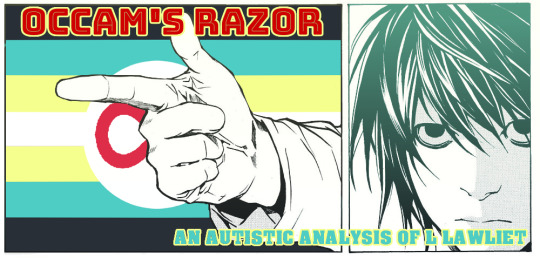
Occam's razor is the principle that, of two explanations that account for all the facts, the simpler one is more likely to be correct.
this post is going to cover traits specific to the manga and the television drama, since those are the best adaptations to showcase L’s autism. THIS POST is required reading before you read anything i’m about to type, because it explains what kind of character niche L falls into--an unintentionally autistic coded character. i’ll talk more about that at the end.
i’m going to talk about manga L first, since he’s the original version after all. i’m going to go in order of physical traits, to behavioral, to his character writing. also, tumblr eats posts that have outside links, so i’m going to have my non-tumblr sources in a separate post, here.
anyways, more under the cut!
MANGA/ANIME:
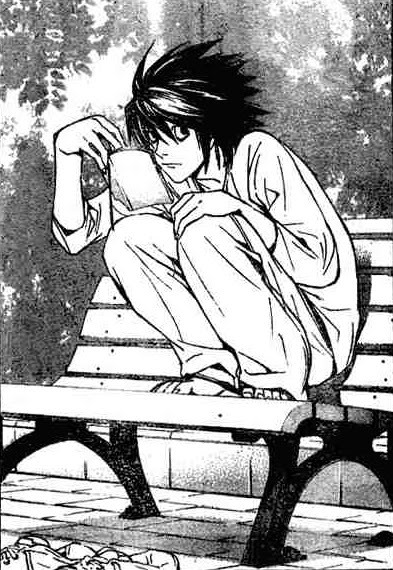
sitting with his legs up and spine bent / sitting on the floor
this is such a big one and its extremely common in ppl with autism. sitting in chairs normally is uncomfortable to outright painful w many ppl with these disorders, myself included. L sitting like that (which, to recall, is a blatant homage to sherlock holmes, another character that is so blatantly autistic coded you can find absolutely ridiculous amounts of writing on the topic) and being like "I HAVE TO SIT LIKE THIS TO THINK PROPERLY" is so autistic. like sitting in a certain way to give you specific sensory stimulus/avoid distracting discomfort and pain is a thing. i found this post (1) written by an autistic person on the topic of sitting in chairs being uncomfortable, and it says as much:
“I suspect that seating discomfort is common in autism (though by no means limited to autistic people). Many of us, particularly as children, benefit greatly from chairs designed to be non-stationary: rocking chairs, “fidget” chairs, and so forth. These can improve focus, compensate for proprioceptive hypo-sensitivity, and alleviate restlessness. In short, many “attention issues” can be fixed simply by providing a little motion for the person sitting. Small change, huge results. That's what accommodations do at their best. They make (often minor) adjustments that have profound impacts.”
so when L says that sitting the way he does, for a specific sensory experience, improves his ability to think, it’s perfectly in line with this idea. Also it’s a good pressure stim.

standing with a slouch / shifting his weight around
to begin: yes! it’s very common for autistic people to stand or walk oddly for a number of different reasons, from physical comorbidity to other issues such as dyspraxia (see: movie L). From an article by YAI (2), an I/DD (intellectual and/or developmental disabilities) community program:
“Kyphosis (a curved spine), collapsed chest, dropped shoulders and even scoliosis are observed in many of our patients. These myriad of postural issues may result from reduced strength, decreased biomechanical stability, or from a sensory impairment, such as apraxia.
Depending on the scene, L has mild to severe kyphosis which is very common in autistic individuals. Other things mentioned in that article if you want to click on it is instability in standing, where you sort of shift your weight around a lot between your feet or rest all of your weight on one foot, which L is literally doing the first time we see all of him.
speaking with a monotone voice.
i obviously can’t show a picture for this one and it honestly depends on the voice actor you find for L, but in the anime in particular L has a very flat tone. a lot of this is bc he has a dry sense of humor but. just know that it’s very common for autistic people to have a flat affect (or go the other way into being too loud/emotive).

his eating habits.
a lot (a LOT) of autistic ppl myself included can only eat certain kinds of food for texture and flavor reasons. HOWEVER there’s a term in the autism community called “samefoods” which is really well put by tumblr users candidlyautistic and autism-asks:
“Samefoods or samefooding is a community word to describe the autistic trait of eating the same food over, and over and over . . . It is part sensory, part routine driven in most cases. A lot of times we samefood because we need that particular mouthfeel / texture / taste, and a lot of times even after that need passes, it turns into a need for routine until you actively dislike that food again.”
“Samefooding on the other hand is closer to a special interest. When I have a samefood (chocolate ice cream, currently), I really, really want that food. I could eat that food endlessly and not get tired of it. I will get upset if I’m not able to have the food in a day. For me, it usually is kind of routine based as well. For instance, with my current samefood, I have some in the evenings and it’s become part of how I wind down from my day.”
we don’t know exactly why L specifically desires sweet food or if he considers it part of his routine, but what we do know is that he really wants to eat sweet food and avoids eating anything other than sweet food, so it could either be that he’s a picky eater and can’t handle savory or he’s samefooding on sweets!
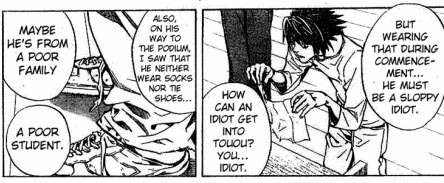
wearing the same clothes
L wears the same clothes every single day. It’s also worth noting that what he does wear is baggy, too-big clothing, the kind that wouldn’t be tight and uncomfortable. once again, sensory issues are a huge thing for autistic individuals. one of my favorite aspects is that in no adaptation does he wear socks. even L wears shoes, he wears them like slippers, not putting them on all the way. people comment that he seems like he’s poor, but we know for a fact that he’s very rich and that wearing these clothes is a personal choice he made.
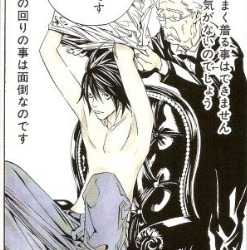
not caring for himself/outsourcing his self-care
i don’t think one day is exactly canon, rather it’s an exaggeration of what might actually happen--i.e. L doesn’t have a huge closet full of the same outfit, but he does have several versions of the same outfit on rotation; L doesn’t use a human washing machine, but Watari might help him/encourage him to bathe regularly. One Day is a parody comic, but it was made by the creators for a reason and that reason is that L pretty obviously relies on a caretaker (Watari) for his personal needs. Watari, in the manga proper, cooks and cleans and does most things for L. we’ll come back to this topic when we get to the drama though.

doing stimming behaviors
if you don’t know what stimming is, it refers to self-stimulating behaviors, usually involving repetitive movements or sounds. everyone stims to some extent, but in autism it tends to be more obvious, go on for longer, and sometimes be more disruptive to others. it’s often used to help deal with sensory overload, or used to express feelings--think of an autistic person being happy and flapping their hands in the air.
there are a LOT of instances of L displaying stimming behavior, from stacking his food or things on his desk, to spinning in his chair, to biting his fingers/using them to press on his lips, to wriggling and tapping his toes. here are some specific instances:


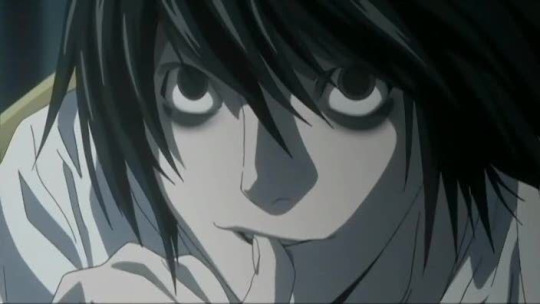
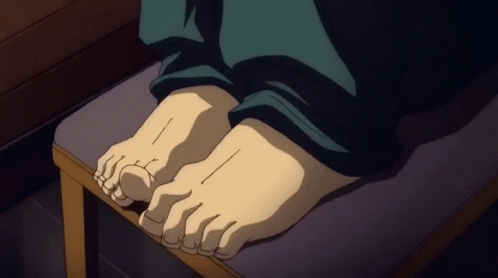
there are a lot more. i’ll talk about more when we get to dramaverse, but if you rewatch/reread death note it’s definitely worth noting whenever L does something like this!
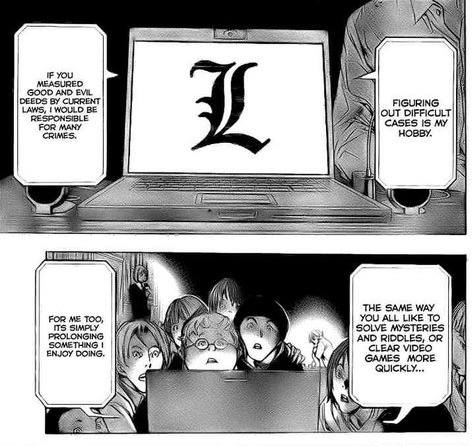
detective work as a special interest
ok, first and foremost i want to establish what a special interest is. Tumblr user cartoon has my favorite explanation of what a special interest is that i’ve seen to date:
“To have a deep, intense, passionate and incredibly focused / narrowed interest in a certain area of study, subject, topic or thing - to the exclusion of other interests. This interest is something that exists for the long-term, most often lasting for multiple months, years, or even you’re entire life “
L says that he only does detective work because it’s a hobby, and he finds it entertaining. We’ve also seen that he’s been at it for quite some time--if you take side content (the wammy’s house comic, LABB) seriously, then he’s been at it since childhood, with unwavering interest. it definitely comes across to me as L having a special interest in detective work, rather than it just being a normal hobby or a job for him, especially since he says it isn’t out of any moral obligation.
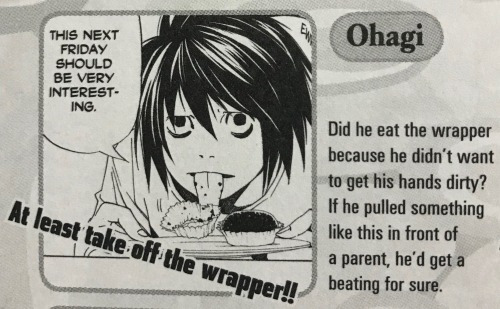
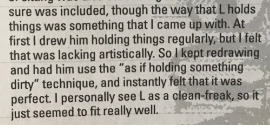
germaphobia
Germaphobia is very common for individuals with autism. a lot of the time it’s actually sensory issues associated with “dirty” things, and a lot of the time it’s because features of OCD are heavily comorbid with autism, including contamination OCD and such fears. regardless of the reason, though, L’s aversion to touching Bad Things is a very autistic behavior, and so is his resulting quirk that he tends to hold things in a very odd manner!

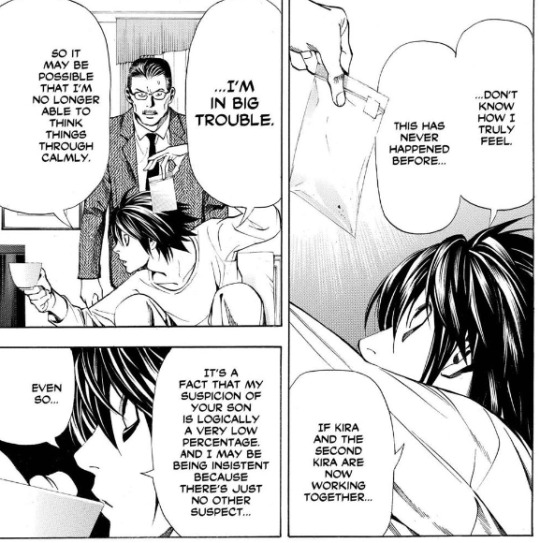
muted emotional expression
this is getting more into L’s character, but L tends to feel and express emotions in a very muted way. not to say he doesn’t have them, but for instance in the example above, L doesn’t have a solid grasp on what exactly he’s feeling. he thinks he might be acting irrationally and overemotionally because he logically should be afraid, but he isn’t sure, and none of these emotions present themselves visibly.
i’ve also seen it said that Ukita’s death is another good example of his muted response to emotion--he tells Aizawa to stay rational and his voice doesn’t waver as he tells him as much, but he holds himself tightly. for someone with poor emotional competence, these physical signs of distress can be hard to read in oneself, but Aizawa (a man who is extremely in-tune with his emotions) can tell immediately.
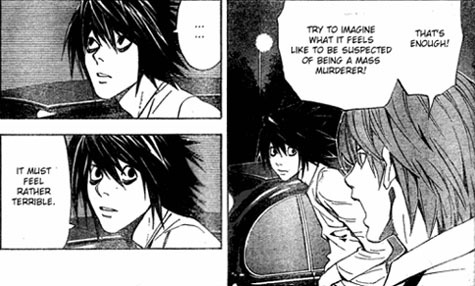
high logic, low empathy
L is also a character who, like many autistic people, lacks a certain degree of empathy. it’s not that he doesn’t have any, but it’s limited enough--and he values logic over it enough--that he’s willing to make extreme decisions and take a “ends justify the means” approach (such as using people as bait.) in the example above, L takes a moment to work through what it must actually feel like, which rings as very autistic.
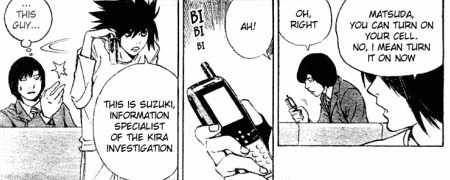
bluntness/not caring about social convention
there are so many examples of this i honestly could list them all day, but L is a character who is very to-the-point and doesn’t care about mincing his words. he can be outright rude to the people around him, especially if he considers them not worth basic courtesy. see: Matsuda.
DRAMAVERSE
if you all knew me you should have known this section is inevitable. i’m not going to talk about every single adaptation because i do not have the time and the only other adaptation that is meaningful in that regard is the movieverse (i am fairly certain that movie L is dyspraxic) but on account of the fact that i don’t care about them i won’t subject you all to them here.
anyway, drama L shows much the same traits as animanga L above (they are, after all, technically the same character) but he displays them in different ways.
he has a much more advanced degree of germaphobia, with Watari saying he’s sensitive to outside air and spraying everyone who enters his space with disinfectant, but not making them wash their hands or anything like that, so we can kind of tell that his issues are more rooted, again, in a fear of germs rather than any actual medical issue. he wants to feel as though he is clean, not necessarily actually be clean. this is very common in contamination OCD, which has a high comorbidity with autism. (my girlfriend has a very good headcanon post about drama L and OCD that isn’t so much analysis than just plain fun, but it’s worth a read!)
he stims, but he has a different array of stims than animanga L--he chews on his jelly pouch bottles,

he tosses it between his hands,
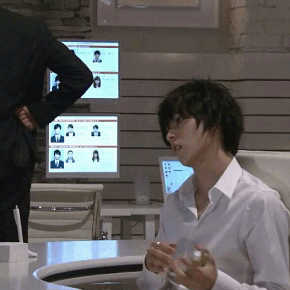
he kicks his feet,

and he bounces in his chair.

he still sits in an unconventional manner. he still samefoods, this time even more exclusively--he only eats Lucky Charge jelly pouches and nutritional bars. Watari onscreen puts his shirts on for him, as well as cooking, cleaning, and mending his clothes for him.
however, there are a few traits that are drama-exclusive that i think really add to an analysis of his autism!
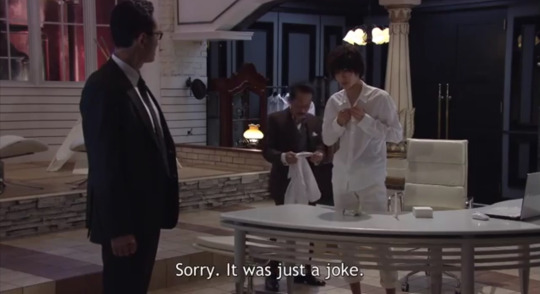
social scripting
social scripting and echolalic scripting are both commonly described as “scripting,” but are very different! echolalic scripting is like echolalia, but echolalic scripting is the recitation of longer passages of dialogue from things the individual has heard before. but social scripting is when you memorize common conversations so you can rattle it off without worrying too much! this can be very handy, such as exchanging basic pleasantries or ordering food, but it can also backfire if someone responds in a way your script’s not set up for. you can find more information on the difference in this video (3).
now, this relates to L in that there are two separate scenes where L says the same thing, rather inappropriately:
L: When I consider Kira’s personality, could it be that the strong-willed daughter is Kira? Or could that sweet-looking son of yours surprise us by proving to be him? You never know what humans are hiding beneath the surface... Soichiro: Enough. L: Sorry. It was just a joke.
-- Episode 2
L: Light-kun. Oh, I’m sorry... If I called you “Yagami-san,” it would be the same as what I call your father. Light: That’s okay. Call me whatever you want. L: Then what about Kira? (silence) L: It's a joke.
-- Episode 4
one could say that L just has a terrible sense of humor--and, of course, having a poor grasp of humor is common with autistic individuals--but the fact that he says nearly the same thing as a defense twice makes me feel as though he has it rehearsed as a defense when people react poorly to things he’s said, which happens often.

mirroring and echolalia
echolalia was briefly covered in the previous example, but for those unaware, via wikipedia (4):
Echolalia is the unsolicited repetition of vocalizations made by another person (when repeated by the same person, it is called palilalia). In its profound form it is automatic and effortless.
mirroring, on the other hand, is explained as such, also via wikipedia (5):
Mirroring is the behavior in which one person unconsciously imitates the gesture, speech pattern, or attitude of another. Mirroring often occurs in social situations, particularly in the company of close friends or family. The concept often affects other individuals' notions about the individual that is exhibiting mirroring behaviors, which can lead to the individual building rapport with others.
both of these are very common in autism, and they’re exemplified while L’s character is established watching his favorite TV show, Owarai Paradise. On one occasion, he’s watching the show and this dialogue happens:
Hiroshi: Despite never telling her how I felt, I still got dumped. I am Hiroshi. Watari: Who was this one again? L: He is Hiroshi. Hiroshi: I am Hiroshi. I am Hiroshi.
-- Episode 2
it’s important to note that in Japanese, “He is Hiroshi” and “I am Hiroshi” are said, at least in this instance, exactly the same, so L is echoing precisely what he’s heard.
On another occasion, L is again watching the show with a glass of wine (seemingly acquired simply to imitate the characters onscreen, as he never drinks it) and when the characters onscreen toast their glasses, L does the same, mirroring them.
CONCLUSION
I linked a post at the very beginning of this analysis talking about how characters are unintentionally autistic coded, and it’s important to understand how this unintentional coding is different from a headcanon--i didn’t make up these traits. they aren’t something that only exist in my head that i ascribe to L for fun.
i made this analysis both because i wanted to share L’s autistic coding in one cohesive place, because plenty of people have made lists before, but none that i could find that included so many examples with images and explanations--and i also made it because of the old ryuzaki persona “theory.”
for those unaware, the ryuzaki persona headcanon suggests that L faked all of these traits in order to make people uncomfortable, to put them off-guard and better mask his identity. i’ve seen posts about people claiming that nobody could actually behave in these ways, that L would surely be unhappy and uncomfortable sitting like that, or eating like that, or engaging in any of these behaviors. I’ve seen some people outright say that L isn’t autistic, but his persona is--that is, he’s pretending to be autistic.
i named this essay “occam’s razor” because, to me, L being autistic is the simplest answer to account for all of these traits. claiming that an autistic coded character is faking it is ableist and it just doesn’t make sense with anything else we know about his character.
but if you want to know more about that, i recommend reading eyecicles’ first!L tag. it’s debunked it in more ways than i ever could.
anyways, in conclusion
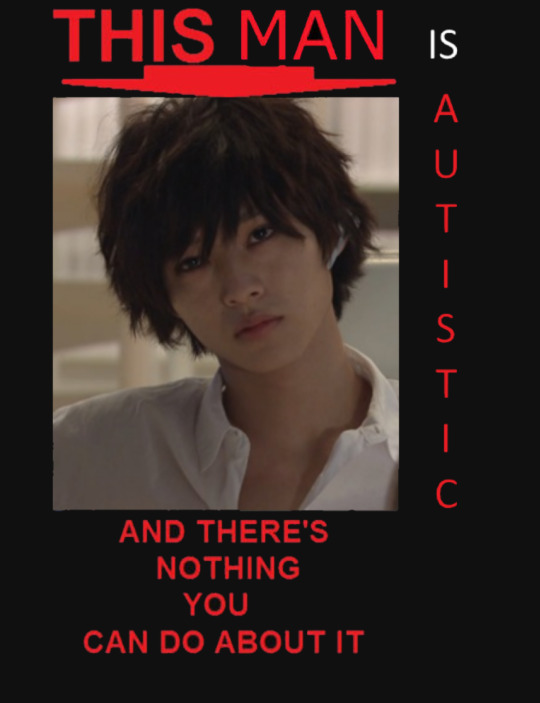
352 notes
·
View notes
Text
Hello Detective Chapter 72
Pairing: Sherlock x Reader
Word Count: 2.3k
A/N: Had a spark of inspiration after some funny comments on my Wattpad version of this story. See the power of feedback for writers lol.
Any and all feedback is appreciated and encouraged!
Masterlist | Add yourself to my taglist | Chapter 71 | Chapter 1

- - - - - - - - - - - - - - - - - - - - - - - - -
You walked around the empty flat, waiting for Sherlock and John to return from the hospital. Mycroft was calling for backup to do a drug sweep due to his recent relapse. The place was quiet, eerily so. You hadn’t walked these halls for weeks, but it felt as if years had worn them down, turning them dark and lifeless. Nothing like the flat you knew. Nothing like your home. It’s like in their bones they sensed your absence. They revolted against it. You glanced towards the closed bedroom door, not being able to bring yourself to open it. You missed him too much for that. The memories you’d made in that room would be too much to face now. Now you had to hold your mask high, you had to play your role and not become distracted.
Downstairs you heard the creak of the door slowly opening and prepared yourself for the confrontation. It was never pretty when Sherlock and Mycroft went at it.
Mycroft was sitting at the bottom of the steps anticipating their arrival. You waited at the landing, not quite stepping into the light yet, using your last few moments to compose yourself for the inevitable argument.
“Well then Sherlock, back on the sauce?” Mycroft spoke immediately as they entered the room, hoping to employ the element of surprise. But of course Sherlock was expecting him. He’d straightened the knocker, of course Sherlock would notice.
“What are you doing here?” Sherlock rolled his eyes, not in the mood for another insignificant lecture.
“I phoned him.” John admitted.
“The siren call of old habits.” Mycroft muttered disapprovingly.
“Old?” You raised a brow, taking a few steps down into the light. Mycroft turned to look at you, concern flashed across his face. He acted like Sherlock ever stopped using, but you knew better.
“You phoned him?” Sherlock asked John again, who wasn’t in the mood.
“Course I bloody phoned him.” John said, exasperated. Did he forget he just pulled him from a drug den? Of course he was bloody concerned.
“And her?” Sherlock asked, with malice in his voice, directed straight at you.
“Oh I’m here against my will, don’t worry I’d never come here voluntarily.” You retorted.
Sherlock opened his mouth to speak, but Mycroft changed the subject before he got a chance. He was too tired to deal with the two of you at eachothers throats.
“Now save me a little time. Where should we be looking?” Mycroft asked.
“We?” Sherlock asked, raising his brow.
“Mr Holmes?” The voice of Anderson echoed from upstairs.
The look of simultaneous anger and surprise on Sherlock’s face caused you to laugh.
“Oh I take it back, this is going to be fun.” You chuckled darkly. This is just what you needed. A good old Sherlock-Anderson standoff like the good old days. God things were simpler back then, even with the homicidal maniac who tried to blow you up.
“For God’s sake!” Sherlock called up to Anderson, pushing past you and Mycroft while making his way up the stairs. The three of you followed in tow.
“Anderson?” Sherlock asked annoyed and exasperated, hoping that he’d misidentified the voice, only for it to be confirmed.
“Sorry Sherlock, it’s for your own good.” Anderson apologized as the rest of you filed into the flat. He stood next to who you assumed to be his new girlfriend, you recognized her from your trip to his apartment all those months ago.
“Oh, that’s him, isn’t it?” The girlfriend asked, “You said he’d be taller.”
She turned and muttered her last statement to Phillip, but you knew that would strike a cord with Sherlock. Just like the hat, it was a delicate subject.
As you suspected, Sherlock flipped up his hood, turned and curled up into his chair, literally folding his body into the fetal position and resting his entire body on the cushion. Frankly, you were surprised he fit.
“Some members of your little fan club, to be polite. They’re entirely trustworthy. Even willing to search through the toxic waste dump that you were pleased to call a flat.” Mycroft said, as John took a look around the place, no doubt noticing the stark change since his absence. You noticed his chair was gone too. “You’re a celebrity these days, Sherlock. You can’t afford a drug habit.”
“I do not have a drug habit.” Sherlock argued, and you scoffed.
“No, he’s a user, remember.” You retorted, and on that subject you didn’t have to act so disappointed.
“Hey, what happened to my chair?” John asked, looking down to the empty spot on the carpet.
“It was blocking my view to the kitchen.” He answered, but you knew that was a lie. More like ‘I missed my wife and the sight only reminded me of her absence’.
“What have you found so far? Clearly nothing.” Mycroft turned back to Anderson.
“There’s nothing to find.” Sherlock yelled from the living room, hoping to stop them from digging.
“Your bedroom door is shut, you haven’t been home all night,” Mycroft began to walk back towards the bedroom, and Sherlock’s head shot up. “So, why would a man who has never knowingly closed the door without the direct orders of his mother bother to do so on this occasion?”
“Okay, stop!” Sherlock yelled, jumping up as Mycroft’s hand neared the door handle. “Just stop!”
What was it he didn’t want anyone to see in there? John noticed his frantic behavior as well. The two of you shared a confused look, and then it hit you. You turned to Sherlock with a surprised look, and he knew you had figured it out. Oh god was she in there? Your face said it all. For a moment Sherlock’s eyes pleaded with you for forgiveness. For a moment the two of you shared an entire conversation through only two glances that quickly slipped away to not jeopardize the roles that you were both playing so well. Mycroft was right, Sherlock never shut the door unless the two of you were in there together.
“Point made.” Sherlock said, and you shook your head, putting your mask back on. They were expecting drugs, but you knew better. He didn’t want to put you through that, knowing he had to fake date another woman was one thing, but flaunting it in your face was another. And that was a line he would not cross. Charles was different, he was in on it, he knew you were married. Hell, you didn’t even know who he was fake dating. While Sherlock and Charles had never officially met the two sure knew a lot about the other.
“Jesus, Sherlock.” John said, shaking his head. Of course he’d think this was his fault partially. He should have checked up on him, he should have been here. Obviously he was taking him getting married and moving out a lot harder than he expected. Of course that wasn’t the whole story.
“I’ll have to phone our parents, of course, in Oklahoma. Won’t be the first time that your substance abuse has wreaked havoc with their line dancing.” Mycroft sighed. How these two boys came from those two parents, you’d never know.
“This is not what you think, this is for a case.” Sherlock explained, hoping Mycroft would understand.
“What case could possibly justify this?” Mycroft asked, and you were curious too.
You’d never pressed and you trusted him when he said it was important, but now, maybe you wanted to know. You could handle the anonymity when you were away from Sherlock but now that he was finally standing in front of you again you wanted to help. Your curiosity was getting the better of you.
“Magnussen” He spoke, and you swore you stopped breathing. “Charles Augustus Magnussen.”
You tried not to gasp but you may have let in a sharp breath that caused Mycroft to turn to you. He knew you were currently a part of the enquiry into him, so you really couldn’t get involved with anything Sherlock was about to say. Panic began to set in and it took every ounce of your MI6 training to not let it show on your face. This was what all this was about? Mycroft sighed and turned back to Anderson and his partner.
“That name you think you may have just heard, you were mistaken. If you ever mention hearing that name in this room, in this context, I guarantee you on behalf of the British Security Services that materials will be found on your computer hard drives resulting in your immediate incarceration. Don’t reply, just look frightened and scuttle.” Mycroft threatened, as Phillip and his girlfriend ran out of the room, closing the door.
Mycroft turned back to John, “I hope I won’t have to threaten you as well.”
“Well, I think we’d both find that embarrassing.” John deadpanned, causing Sherlock to laugh, he looked at you hoping to share in a quick smile. He was met with your unamused face, eyes still slightly wide as you fought to keep your breathing at a stable rate.
“This isn’t funny.” You said, one hundred percent serious. He furrowed his brows a bit. Normally you would have found that hilarious, but clearly something had changed. That wasn’t just a part of the act. That felt real.
“Magnussen is not your business.” Mycroft said to John.
“Oh you mean he’s yours.” Sherlock pointed to Mycroft. You could feel your throat tightening, you urged the feeling to go away. You could not show any signs of fear. Magnussen held your entire life in the balance, you couldn’t allow even a tiny slip up.
“You may consider him under my protection.” Mycroft said, you turned to him furrowing your brows for a moment. You didn’t know that, though it didn’t change much. You now had a face to the immunity power that Magnussen had.
“I consider you under his thumb.” Sherlock seethed. You moved your hands behind your back to hide them shaking. You tried to keep Sherlock away from your Magnussen mess and here he was smack dab in the middle of it.
“If you go against Magnussen, then you will find yourself going against me.” Mycroft said.
“And me.” Your voice wavered. If Sherlock attacks Magnussen there's nothing stopping him from releasing the information on you and your uncle. Your words shocked everyone in the room, even Mycroft. A quiver of a brow was all you got in response from Mycroft but you knew that wasn’t the end of the conversation.
“Okay, I’ll let you know if I notice.” Sherlock shot back. He began to walk towards the door.
“Erm... What was I going to say? Oh, yeah. Bye-bye.“ He opened the door and pointed out. Mycroft made his way towards it, as you followed.
“Unwise, brother mine.” Mycroft said, just having to get the last word. You were ready to roll your eyes before Sherlock jumped into action, surprising you. Sherlock grabbed Mycroft’s arm, twisted it behind his back and pinned him against the wall.
“Brother mine, don’t appall me when I’m high.” Sherlock seethed in his brother's ear, causing him to groan in pain.
“Hey!” You shouted, pulling Sherlock off of him and pinning Sherlock to the wall instead. Maybe this is what Mycroft meant by backup. You raised your elbow, pinning him in place as he winced slightly. That wasn’t fake. Having never seen this side of you, his eyes danced curiously across your face looking for any glimpse of an explanation. You held your demeanor.
“I hope you fully understand what you’re about to get yourself into here.” You scold, hoping he understands your warning. You didn’t just mean fighting with Mycroft, you meant Magnuseen. He was not someone to fuck with, and whatever he was getting himself into, it wouldn’t end well for anyone.
Mycroft picks up his umbrella and makes his way down the stairs, straightening his suit and thankful for your help, though he’d never admit it. You remove your arm from Sherlock's neck as he sucks in a breath of air. You turn and follow Mycroft down the stairs without another word.
You were angry, seething on the inside. Magnussen was ripping your life apart at every turn. You hated him, you wanted to kill him, to dismember him limb by limb, but you were powerless. You couldn’t even talk back to the man without fearing the repercussions. He owned you.
As you stepped out onto the street Mycroft turned to you, glancing around to make sure no one was in earshot.
“Keep an eye on him. Don’t let him dig too deep into this.” He said, keeping his voice low.
“Absolutely not.” You shook your head, you couldn’t do that even if you wanted to.
He seemed unsatisfied at your volume, and quickly glanced up to the window into 221B above you. Something must have caught his eye because he grabbed your arm and pulled you back under the awning of Speedys, keeping the two of you out of eyesight.
“I don’t care that the two of you... broke up.” He waved his hand, as if saying those words disgusted him. “That can’t stop you from doing your job.”
“Mycroft, we shouldn’t even be discussing this. With the enquiry going on, you know I can’t get involved. My hands are tied. Magnussen is untouchable, even Sherlock can’t get to him.” You pressed, shaking your head, holding back your anger.
You turned and walked back towards the street, raising your hand to hail a cab. As one began to pull over you heard Mycroft begin to call your name. You whipped back to him before he had a chance to continue the conversation.
“Drop it.” You said forcefully, pointing your finger at him, turning and opening the cab door.
Before stepping in, you turned and glanced up at the window, feeling eyes on you. Sherlock stood, watching the interaction carefully. You shot him what you hoped was a warning look as you sank into the backseat and slammed the door.
You let out a groan as the car pulled away, wishing you could take Charles up on his murderous offer.
- - - - - - - - - - - - - - - - - - - - - - - - -
Any and all feedback is greatly appreciated and encouraged!
Taglist in Reblog
Masterlist
#Sherlock#sherlock holmes#sherlock x reader#sherlock imagine#sherlock imagines#sherlock holmes x reader#sherlock holmes imagine#sherlock holmes imagines#benedict#benedict cumberbatch#benedict x reader#benedict imagine#reader insert#john watson#martin freeman#benedict imagines#benedict cumberbatch imagines#benedict cumberbatch imagine#benedict cumberbatch x reader#john x reader#john watson x reader#mycroft#mycroft holmes#mycroft x reader#mycroft imagine#mycroft imagines#john watson imagines#john watson imagine#johnlock#bbc
101 notes
·
View notes